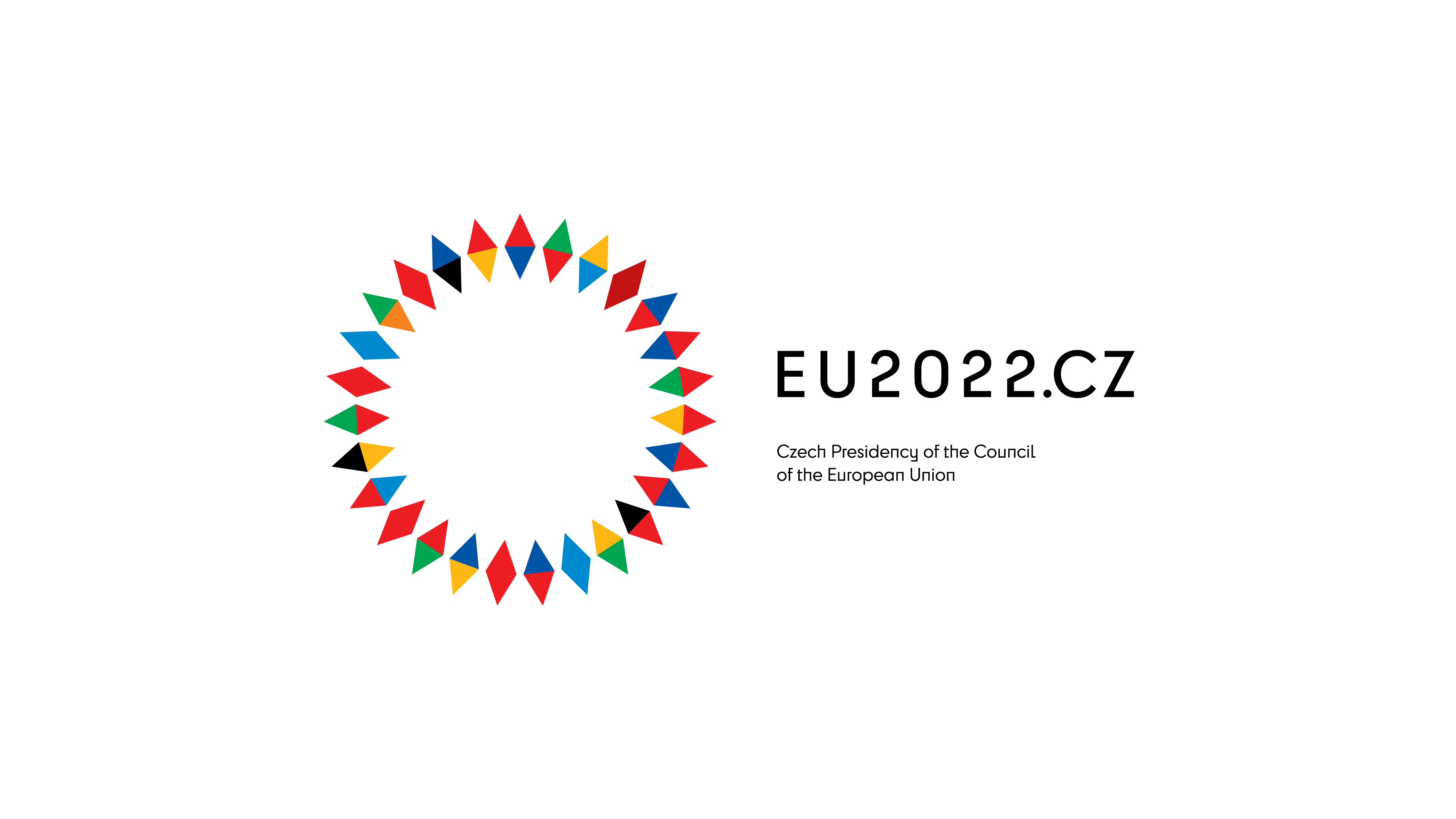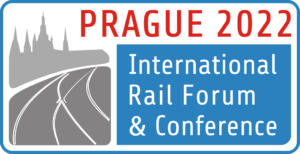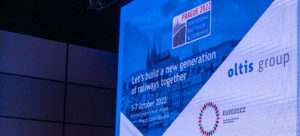(English) Europe is not just a name for the continent we live upon. It is first and foremost a collection of principles and values which we uphold and cherish together.
The fundamental ones are freedom and responsibility. Freedom of individuals, but also of nations. Responsibility for oneself, for our families, for other citizens, but also for the environment that surrounds us.
“ CZECHIA at the heart of Europe” The Presidency of the Council of the European Union 2022
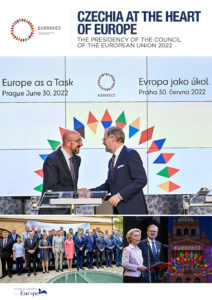
Petr Fiala, Prime Minister. Europe as a Task: Rethink, Rebuild, Repower is the main motto of the Czech Presidency of the Council of the EU.
Petr Fiala, Prime Minister
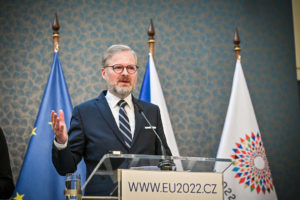
Europe as a Task: Rethink, Rebuild, Repower is the main motto of the Czech Presidency of the Council of the EU.
Europe is not just a name for the continent we live upon. It is first and foremost a collection of principles and values which we uphold and cherish together.
The fundamental ones are freedom and responsibility. Freedom of individuals, but also of nations. Responsibility for oneself, for our families, for other citizens, but also for the environment that surrounds us.
The Russian invasion of Ukraine has shown us that our freedom and security are as threatened today as they were in the past. The fight for freedom never ends.
The task of the European Union and the Czech Presidency of the Council of the EU is to assist Ukrainians who are currently fighting for their homeland and for the freedom to choose their future.
The Russian invasion has triggered the largest population movement in Europe since the end of the Second World War. It also far exceeds the migration wave of 2014-2015. The Czech Presidency is focusing on effective European cooperation and solidarity to achieve long-term successful integration of refugees into the societies of the EU Member States.
Another important task of the Czech Presidency will be the post-war reconstruction of Ukraine. This should focus on restoring critical infrastructure, ensuring essential services, strengthening resilience and overall economic stability. The EU’s intensive cooperation with Ukraine and the coordination of the necessary financial resources of the entire free world will be crucial.
The need for an accelerated transformation of Europe’s energy sector is even more urgent today. Its decarbonization is no longer only about climate protection. It is now, above all, a condition for our independence and energy security. The EU’s climate commitments are heading towards the end of this decade. This transformation must be carried out in an economically and socially sensitive manner, to not jeopardize the standard of living of our citizens and the competitiveness of our industry. The Czech Presidency will focus on implementing the RePowerEU package, which includes a faster transition to low-carbon and renewable energy sources, energy savings or more resilient, diversified sources.
The Czech Presidency will also seek to strengthen European defense capabilities, especially in cooperation with NATO, where the priority is to support the implementation of key topics under the Strategic Compass. The development of long-term cooperation in strategic military systems is essential. In addition, we will seek budgetary support for the renewal of the armaments of European armies.
The COVID pandemic and the war in Ukraine remind us that we need to strengthen supply chains and increase the resilience of the European economy to external threats. The Czech Presidency aims to move forward as quickly as possible with the conclusion of trade agreements with democratic states and to deepen transatlantic cooperation within the EU-US Trade and Technology Council (TTC), with an emphasis on strategic cooperation.
Europe is currently facing many problems and challenges, but if we act with unity and determination, we will emerge stronger and more resilient from these crises.
Petr Fiala, Prime Minister

Jan Lipavsky, Minister of Foreign Affairs of the Czech Republic
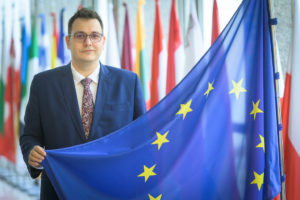
I am pleased that the Journal Général de l’Europe, a prestigious magazine praised in the European professional community, decided to dedicate an edition to our country for the 2022 Czech Presidency in the Council of the European Union.
I am convinced that the initiative will help us introduce the themes and goals of our presidency in the Council of the European Union. The initiative will increase the professional community’s awareness of Czechia and show how we share various economic and social themes with the rest of Europe. The goal of the publication is to outline the political, economic, and cultural relations between Czechia and EU member states. We also want to show how Czechia is intertwined with the EU and how our cooperation has developed in the last decade.
This edition, intended firstly for European institutions, European representatives, and relevant political and socio-economic figures in the region, both on the national and European level, will be available for the entire duration of our Presidency.
I would like to thank the team from the Journal Général de l’Europe for the opportunity to draw the European community doser to the Czech outlook for our Presidency term.
Jan Lipavsky, Minister of Foreign Affairs of the Czech Republic

Mikuláš Bek Minister for European Affairs,We have grown up in the EU
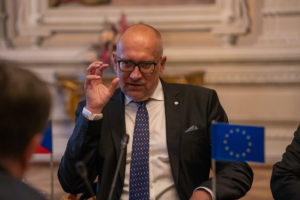
We have grown up in the EU
This is the name of the exhibition that will travel around the Czech Republic during the Czech Presidency. At the same time, the headline is also a kind of metaphor for our eighteen-year membership in the European Union. As well as young people at the age of eighteen, who mature, leave the period of defiance and take responsibility for their functioning in society, I believe that the Czech Republic, in its relationship with the European Union, has also come to co-responsibility for the formation and functioning of our common European living space.
Responsibility for Europe’s role is also at the heart of our Presidency motto: ‘Europe as a task: Rethink, Rebuild, Repower’. We want to acknowledge the legacy of Václav Havel, who in the breakthrough decade of the 90s – like us today – felt the need to redefine Europe’s role in the changing world order. Like the fall of the Iron Curtain, the current war in Ukraine has changed political constants in Europe for decades in a matter of weeks. At the same time, the motto is a pragmatic reminder that we must all be constantly working towards a modern and functioning Europe.
The Czech Republic takes over the EU Presidency in difficult times. War returned to Europe after many decades. We are witnessing the most massive refugee crisis in Europe since World War 2. National governments and the European Union as a whole are addressing vital issues such as energy and food security, record inflation and defense against multiplying cyber-attacks threatening the functioning of our increasingly digital society. The answer to most of these risks and threats will have to be sought at European level.
As the presiding state, we have before us the difficult task of a mediator and a crisis manager at the same time. Over the course of six months, we will moderate the European debate and seek viable compromises between the interests of individual Member States. We will represent the Council of the EU in negotiations with the European Commission, the European Parliament and, in part, external partners. Given the intensity of the sense of threat from different sides, a considerable amount of diplomacy and creativity will be needed. Above all, however, it will be necessary to maintain European unity. And the Czech Republic, as a state located in the heart of Europe, is well placed to do so.
This also applies to the first priority of the Czech Presidency, which is to resolve the refugee crisis and support Ukraine in its fight for peace and democracy. The Czech Republic has its own historical experience with Russia’s expansionist policy and is also the target country of the current migration from Ukraine. We are therefore very well equipped to moderate the European debate with due empathy.
As for the other priority areas, most of them have been on the table for some time, but the situation associated with the war in Ukraine has clearly accelerated the discussion on some of them and increased the importance of others. One of the crucial topics will be the strengthening of the European Union’s defense. The new situation has created more positive environment for the debate on European defense capabilities, which has so far been hampered by concerns among some Member States about a possible weakening of the alliance with the United States.
The new situation has also underlined the importance of moving towards a green Europe. Moving away from fossil fuels is not just a question of meeting climate targets, but of energy security and economic viability. Also in this area we will strive for as many European solutions as possible, for example in the area of joint purchases of natural gas or the development and sharing of transmission systems.
From the beginning, when I took up the post of Minister for European Affairs, I was clear that one of the priorities should also be the resilience of democratic institutions – as well as now, in the light of events on the Union’s eastern border, the security motive emerges as the common denominator of the Presidency’s priorities. Russia’s aggression has once again urgently reminded us that Europe’s long-term prosperity and stability is based on functioning democratic mechanisms. We will therefore focus on the protection of electoral processes and the freedom of the media.
This does not mean that we forget other long-term and urgent priorities, such as the Digital Agenda, cybersecurity or strengthening supply chains through new trade agreements.
The main motto ‘Europe as a task’ – and in particular its ‘Rethink’ dimension – is also reflected in continuing the debate on the future of Europe. It will fall under our Presidency to implement the reform proposals that have emerged from the Conference on the Future of Europe. We see this as a unique feedback from citizens on what kind of Europe they would like to live in.
The final report contains 49 proposals and several hundred measures of various types and importance. It will be necessary to determine what can be implemented in the existing legal framework and what would require change to the EU treaties. In any case, during our Presidency, we will look for a way to reflect citizens’ demands quickly and operationally.
Last but not least, it is important to realize that our Presidency efforts will not completely disappear by the end of this year. From the outset, we have been in intensive dialogue with other Member States of our Trio Presidency – France and Sweden – on how to continue as effectively as possible what our French colleagues have started and what our colleagues from Sweden will be able to follow up on.
We are in for a ‘hot summer’ and a ‘hot autumn’, but I hope that we will prove ourselves as the capable EU Presidency. After all, we are already, as I mentioned at the beginning, adult members of the European family.
Mikuláš Bek, Minister for European Affairs

Edita Hrdá, Head of the Czech Permanent Representation to the EU, CZECH PRESIDENCY AS A LEARNING OPPORTUNITY FOR ALL
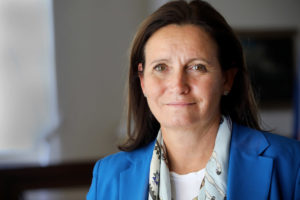
18 years after becoming a member of the European Union, the Czech Republic takes over the Presidency of the EU Council for the second time in its history. Presiding over the work of the Council is never an easy task. The role of the Presidency is to encourage member states to reach a consensus on often complex and contentious issues, to represent the Council in negotiations with the European Parliament and to drive forward progress on EU legislation.
In order to succeed in these tasks, the Presidency needs to be able to understand the various sides of the debate without ever losing sight of the ultimate goal and to act as an honest and neutral broker. The Czech Republic is aware of the important and difficult nature of this role.
However, nothing could have prepared us for the scale of the challenges that lay before us. The problems caused by climate change, the COVID pandemic that is not over yet, the unprecedented war in Ukraine, the ensuing food and energy crises that have only added to it.
Nevertheless, we are up to the task and are keen to learn as much as possible from the experience. Our membership of the EU may have only recently come of age, but we have a solid and enthusiastic team made up of old hands and fresh faces, who are ready and willing to take on the challenges that will no doubt come our way in the months ahead.
The Czech Presidency’s motto is ‘Europe as a task: Rethink, Rebuild, Repower’. The first president of the Czech Republic, Václav Havel, saw Europe not as a fait accompli but as a continual work in progress, one that both called for and rewarded new ways of thinking. The challenges facing us today may be unprecedented, but they also provide an opportunity to reconsider Europe’s role in the world and explore new ways of achieving our goals.
Yet it is not only about challenges. The Presidency of the Council of the EU also provides us with the means and space to showcase the best our country has to offer. That is why as well as preparing for our legislative role, we are ready to organize a serie of seminars, brainstormings and conferences. We have also put together an extensive cultural programme to promote the achievements of our artists, writers, filmmakers, photographers and dramatists, in Brussels as well as in other places.
The months ahead will no doubt provide also a valuable learning experience, an opportunity to share our country’s achievements, and a chance for one of the EU’s “youngest” nations to spearhead new approaches and new ways of thinking about the challenges facing all Europeans today.
Edita Hrdá, Head of the Czech Permanent Representation to the EU

Věra Jourová, Vice-President and Commissioner for Values and Transparency, leads the group of Commissioners concerned with “a new impetus for European democracy”.
Czech Presidency to the EU – Bridge between East and West
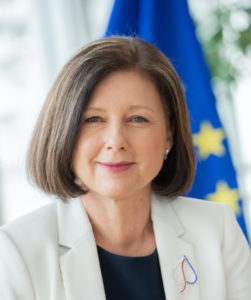
The Presidency of the Czech Republic falls on one of the most difficult periods in Europe’s recent history. Russian bombs and missiles are destroying Ukrainian cities. Millions escaped to various EU countries. Millions of European citizens are under constant pressure of Russian propaganda and disinformation.
The impacts of the war are felt by everyone: skyrocketing energy prices, risks to food security and to the global and national political stability.
As Chancellor Scholz noticed recently in a speech in Prague, the centre of gravity in Europe is shifting to the East.
One thing is clear. The EU can face these challenges only if it acts united. Keeping the EU together is potentially the biggest task of the coming years.
The Czech Republic is the right country to preside over the Council of the UE, because it is a bridge between the East and West, it has empathy to understand different point of views and a diplomatic skills to navigate through the stormy waters and build compromises. The Czech Republic knows how to organise help and promote an ambitious enlargement policy for Ukraine or in the Western Balkans. It has the historical experience to know how to resist foreign lies and aggression, appreciates how fragile freedom and democracy is and how desperately we need to defend it.
As many of us have experienced authoritarian rule from Moscow before 1989, the Czechs understand well that the strength of democracy lies in its values and freedoms. We can promote democracy only by practicing it and demonstrating its advantages over authoritarian rule. Therefore, I truly appreciate the commitment of the Czech presidency to democracy and rule of law. The spirit of Presidency based on the legacy of Václav Havel proves it above all .
Already before this brutal and illegal aggression the times were challenging. Europe has been addressing digital and green transformation, while witnessing the rise of extremist political forces and risks of democratic backsliding. There are some systemic problems, not only in the EU, for instance when it comes to the rule of law, independence of judiciary or free and pluralistic media or huge waves of disinformation.
Therefore the EU adopted the European Democracy Action Plan, setting out a reinforced EU policy framework to strengthen democratic resilience. The Czech presidency will have a task to implement key elements of this plan.
Under this plan, we have already proposed some new laws, like transparency of political ads and the work on it in the Council needs to conclude fast, if we want to be ready for the next elections to the European Parliament.
But I also count on the Czech presidency to advance and rally support for evolving threats such as disinformation, especially online.
We see now how foreign information manipulation and interference is used as a strategic and coordinated tool by Russia to support its aggression against Ukraine – to get international support for its war and deflect blame from its violation of international law.
Online disinformation is a societal issue, ranging from foreign interference by malicious actors to an unhealthy and increasingly tribal information environment. From digital platforms that allow spread of conspiracies to misuse of targeted advertising for manipulative purposes or pure propaganda. Our European approach is therefore also complex. The European Democracy Action Plan lays out our ideas on digital literacy, societal resilience as long-term goals, on top of countermeasures to foreign interference and information manipulation.
The first rule we follow is what is illegal offline must me illegal online. We have a new legislation for that – the Digital Services Act.
However, we also want to go beyond regulation. We opted for the so-called Code of Practice. Complementing legislation, Codes can be more specific, detailed, flexible, involve other actors and invoke corporate responsibility.
The anti-disinformation Code is not only about big platforms, but also smaller ones, as well as the advertising industry, since there are also economic incentives in spreading disinformation. And everyone is free to join.
It is not about assessing the content and deciding right from wrong. We are looking at all aspects – actors, behaviour, and impact.
The Code will disrupt the financing and business model as it obliges the signatories to pay attention, to demonetise content that becomes viral thanks to tricks or that is illegal or harmful.
Then, the platforms will have to open up and show how this ‘open market’ is working in reality. They will have to provide data that will help us in Europe to understand what is really happening on these platforms when it comes to information manipulation. Thanks to this and the legal obligations in the Digital Services Act, researchers will have insights to help us better look behind the wall of algorithms.
The Code also takes concrete measures against manipulative behaviour used also as part of foreign information manipulation (like fake accounts, bot-driven amplification, malicious deep fakes) and establishes a stronger cooperation within the industry.
Finally, we want the users to be more in control, like holding an old-fashioned TV remote control. They choose the channel and programme.
We also want to look into new and innovative ways to battle disinformation, to use cutting-edge technologies and to help national authorities with the best knowledge provided by researchers and practitioners. Therefore, we supported the establishment of the European Digital Media Observatory, a pan-European network of hubs. One of them is also based in Prague.
Naturally, online platforms and technology are only part of the problem. The best antidote against disinformation is strong and pluralistic media. Such media are an essential pillar of democracy. This is why the Commission is taking steps to support journalists and media also across the EU.
A first priority is the safety of journalists. Journalists risk their lives to inform us. Some of them have already been killed while doing their job in Ukraine, covering Putin’s war. But journalists do not only die in war zones. Journalists have been murdered here in the EU.
Therefore I urge Member States to implement the Recommendation of the Commission on the safety of journalists.
The Commission has also proposed legislation and recommendations to tackle abusive litigation against journalists – the so-called SLAPP.
As another important next step, we have proposed during the Czech Presidency a new media law – the European Media Freedom Act. The aim is to introduce legal safeguards at EU level to protect the independence of the media and media pluralism.
Media companies cannot be treated as just another business. They are essential for democracy. With this new law we want to ensure that there will be no political pressure on the media, especially the public media, that the ownership will be transparent and that the editorial decisions are independent.
The Czech presidency plays an important role in launching the discussion on this sensitive matter.
Václav Havel wrote: ‘The natural disadvantage of democracy is that it is extremely tiring to those who mean it honestly, while it allows almost everything to those who do not take it seriously.’ I am convinced that the Czech presidency will be tirelessly working on key priorities for Europe today and honestly upholding European democracy and our common values.

Věra Jourová, Vice-President and Commissioner for Values and Transparency

Vít Rakušan, 1st Deputy Prime Minister and Minister of the Interior
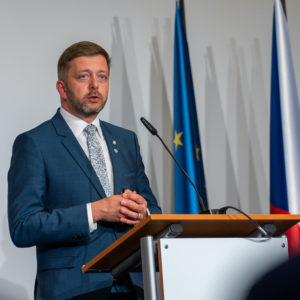 Vít Rakušan, 1st Deputy Prime Minister and Minister of the Interior
Vít Rakušan, 1st Deputy Prime Minister and Minister of the Interior
Journal Général de l’Europe (JGDE): Can you briefly introduce us to the Ministry of Interior? missions and duties at national level (reform of specialized police services, and others)
Vít Rakušan (VR): The Czech Ministry of Interior is in charge of a vast number of areas relating to Home Affairs, most notably internal security, border protection, public administration and eGovernment. In the area of migration and border protection, the work of ministry, focuses, for example, on granting refugee status or residence to foreign nationals, as well as their integration into society. In this area, the international cooperation is very important.
In regard to public administration and eGovernment, we strive to make the services quicker, more effective and more available to our citizens through digitalization. Other tasks include road traffic safety supervision, maintaining archives, state, economic and service secrets or maintaining public order.
Furthermore, the ministry oversees the work of Police and Fire service and cooperates with Interpol.
JGDE: What are your priorities for the Presidency?
VR: The most important priorities for the Ministry of Interior include the impact of the war in Ukraine on various areas of Home Affairs, as well as ensuring the proper and secure functioning of the Schengen area and strengthening security of EU borders. This goes hand in hand with the need to continue discussions on the future EU asylum and migration policy following the successful work of the French presidency.
In the area of internal security, we will work on improving the cooperation of law enforcement authorities, while paying special attention to enhancing fight against child sexual abuse.
Regarding the area of General Affairs, the Czech Presidency will continue negotiation of the legislative proposals presented in the package on protecting election integrity and promoting democratic participation. We will also continue discussing the Reform of the EU electoral law submitted by the European Parliament.
In the area of eGovernment, the Czech Presidency will play an active part in shaping the European Digital Identity aiming at increasing the availability of a secure and trust electronic identification to EU citizens by introducing European Digital Identity Wallets.
JGDE: Incidence of the war in Ukraine?
VR: The war in Ukraine has consequences for migration and security that the Czech Presidency is ready to actively address.
Our security is negatively affected by cyberattacks and hybrid attacks connected with dissemination of disinformation linked to the Russian Federation. Special concerns relate to trafficking in human beings and, in general, to crimes against children and youth.
In a broader perspective, risks arise from the permeable Eastern borders of Ukraine, a huge amount of firearms on the territory of Ukraine, impacts of the war in terms of destabilisation of wider EU neighbourhood (Moldova) as well as a potential increase in migration as a result of an imminent food crisis.
The topic was high on the agenda of the Informal Meeting of Home Affairs Ministers on 11 July in Prague, where we discussed the need for close cooperation with the Ukrainian and Moldovan authorities as well as ways to help these countries in coping with increased security risks.
The EU Member States, Ukraine and Moldova should therefore systematically exchange data on the investigations of human trafficking, document forgery, money laundering, arms trafficking, organised property crime, and other types of crime as well as on hybrid threats related to the war in Ukraine. To facilitate this, the EU Support Hub for Moldova, which aims at deepening EU-Moldova cooperation in the areas of security and border management, was officially launched at the Prague ministerial meeting. The EU and Moldovan authorities, including representatives of Frontex, Europol and the Moldovan Police, will participate in the project directly in Chisinau.
JGDE: The reform of the European asylum and migration policy and the protection of the Schengen external border?
VR: In terms of the European asylum and migration policy, we will strive to build a resilient system that will be able to address the causes of migration, the protection of our borders as well as the issue of solidarity.
Regarding the internal dimension of migration and building on the gradual approach initiated by the French Presidency, we would like to start trialogues with the European Parliament on the screening and Eurodac regulations. The Czech Presidency is committed to achieve tangible progress in the reform of the European asylum and migration policy.
The Czech Presidency will also open the debate on the legal migration package and visa digitalization.
As for the external dimension of migration, we will focus especially on the eastern and southeast neighbourhood. The flagship event will be the Ministerial Conference of the Prague Process to be held on 24 and 25 October 2022 in Prague.
Regarding the proper functioning of the Schengen area and strengthening security of EU borders, we would like to make the next generation of the Schengen Information System operational in autumn 2022.
We will also focus on the implementation of the Schengen Strategy presented by the Commission last year. Emphasis will be put on the revision of the rules for the reintroduction of internal border controls and the streamlining of external border management. Last but not least, we will devote our attention to making progress as regards Schengen integration of Bulgaria, Romania and Croatia.
JGDE: European different projects of collaboration, the perspective of development?
VR: The need for collaboration on a European level is needed especially in enhancing fight against child sexual abuse. The exponential development of the digital world has made it possible to create a global market for child sexual abuse material. This topic is high on the agenda of the Czech Presidency in the context of the new legislative proposal presented by the Commission in May. The new EU regulation should set uniform rules for online service providers that would oblige them to detect and report online child sexual abuse material. That should enable better prevention and punishment of child sexual abuse.
We are well aware that this proposal is very complex and addresses some sensitive issues and that the negotiations will not be easy, but our goal is to make as much progress as possible. Protecting our children is number one priority, as we discussed it at the informal meeting of Ministers of the Interior on 11 July in Prague. There, we focused our attention on the issue of providers’ obligations.
Our aim in this area, in general, will be to ensure that the new system is balanced and that the obligations resulting from it are comprehensible and realistic. It will be key to strike a fair balance between the protection of child victims and the security on one side and privacy rights of all users of online services on the other side.
European cooperation is also important in the area of drugs policy, where we will focus also on the revision of the regulation on the European Monitoring Centre for Drugs and Drug Addiction.
JGDE: What are the major challenges in the national and international area in the world of today and tomorrow?
VR: We address some of the biggest challenges in the national and international area in our priorities for the Presidency. The greatest one as of now is the war in Ukraine and its consequences Besides that, the well-known challenges remain relevant: internal security, disinformation and cybersecurity threats.

Jana Černochová, Minister of Defence of the Czech Republic

The Presidency is both a great opportunity and a significant challenge. Russia’s brutal aggression against Ukraine has clearly demonstrated the need to rethink some of our basic assumptions and approaches. It has also brought us closer together. We now clearly see that the EU can act swiftly, effectively, in a united manner, as well as in coordination with NATO.
The Czech Presidency’s goal is to contribute to a safer and prosperous Europe. The EU should – together with NATO Allies and other like-minded states – be a defender of shared values, human rights, freedom, and liberal democracy.
The Ministry of Defence will work towards a safer and stronger Europe in the following areas:
- EU-NATO cooperation
- Support for Ukraine
- Implementation of the Strategic Compass
EU-NATO Cooperation
The EU-NATO cooperation is a key component of a safe Euro-Atlantic area. A strong and safe EU means stronger and safer NATO, which remains the cornerstone of our collective defence. The EU and NATO have a great potential to complement each other with their respective tools. Their even-closer cooperation can thus help prevent duplicity and allows for higher effectiveness.
The strategic partnership between the two organizations is built on shared democratic values and the rule of law. The current security situation in Europe has brought the EU and NATO closer than ever. It is now crucial to continue this effort, deepen the political dialogue, and act united. During its Presidency, the Ministry of Defence will work hard to further unify the two organizations and increase effectiveness, while avoiding duplication.
Support for Ukraine
Russia’s invasion of Ukraine has had a major impact on geopolitics and the security environment in Europe. The EU, including the Czech Republic, has stood by Ukraine since the very beginning of the war. That is why a resolute support for Ukraine is one of the Czech Presidency’s main priorities. The Czech Republic will ensure the EU continues helping Ukraine both in its fight for its freedom as well as with the country’s post-war reconstruction.
Ukraine’s reconstruction and our cooperation with Eastern European countries is an investment into our common, safe future. We are connected by shared values, such as democracy and freedom, and our determination to protect them. That is why our aid to Ukraine is so crucial.
Implementation of the Strategic Compass
The Strategic Compass is a result of the Member States‘ close cooperation and common effort to strengthen the EU’s security and defence. It is a key document – a first security and defence strategy of the EU – which outlines the steps for the EU to become a more capable security provider. During its Presidency, the Czech Republic will continue with the Compass’ implementation.
The EU is responding to the current changes in the security environment and the Compass will help us face current and emerging threats. Due to Russia’s aggression against Ukraine, we understand that cooperation and unity among like-minded states is more important than ever. A stronger and more capable EU will contribute to global security and complement NATO’s military power, which remains the cornerstone for our collective defence.
In this regard, the Ministry of Defence will primarily focus on countering hybrid interference, military mobility, modern technologies, space, capability development, boosting investment, and cooperation with partners, especially NATO.
Pavel Blažek, Minister of Justice
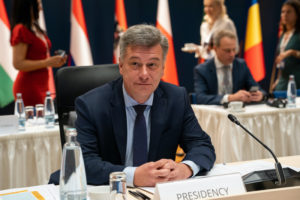 Pavel Blažek, Minister of Justice
Pavel Blažek, Minister of Justice
Priorities of the Czech Presidency
Criminal Law
- Joint EU Endeavoursand Coordination on Judicial Aspects in Criminal Matters in Respect of the Russian Aggression against Ukraine
- Revision of the Directive on the Protection of the Environment through Criminal Law
- E-evidence Package
Civil Law
- Citizen-friendly Justice
- Legal Protection of Vulnerable Persons
- Building Bridges between Judicial Systems
- Strengthening Judicial Cooperation between EU Member States and Third States
- Promoting Synergies between the EU and International Organizations in the Area of Judicial Cooperation in Civil Matters
Digitalisation Package
- Regulation Concerning the Digital Information Exchange in Terrorism Cases
- Joint Investigation Teams Collaboration Platform Regulation
- Regulation on the Digitalisationof Judicial Cooperation and Access to Justice
- Directive on Digitalisationof Judicial Cooperation
Fundamental Rights
- EU Accession to the European Convention on Human Rights

Ivan Bartoš, Deputy Prime Minister for Digitisation and Minister of Regional Development
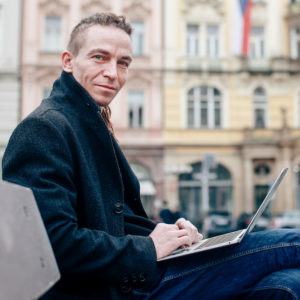 Ivan Bartoš, Deputy Prime Minister for Digitisation and Minister of Regional Development
Ivan Bartoš, Deputy Prime Minister for Digitisation and Minister of Regional Development
As a Minister responsible, among others, for regional development, I will focus during the Czech Presidency on Cohesion Policy as a very important European investment tool helping Member States and their regions to develop. I would like to provide the EU with a vision. The 8th Cohesion Report, published this spring, is an excellent starting point and basis for this reflection. Cohesion Policy has a great value for stimulation of sustainable economic growth and it is the only policy reflecting territorial and regional specifics and potentials. It is irreplaceable and significant to ensure the development of all regions and to decrease differences across all EU regions.
Cohesion policy is able to respond to new challenges and to the regions’ needs. It is dealing with regional development, but also with climate change, digitalisation and energy transition, helping in general to meet current goals and directions of the EU.
This policy is also able to respond flexibly to unexpected situations, such as crises or natural disasters and has been the very first policy to react to the pandemic. It also helps to combat natural disasters such as drought or the bark beetle calamity.
For six months, the Czech Republic will run European meetings and create compromises and agreements among Member States, a role known as an honest broker – an honest distributor of information among all players while maintaining neutrality of a presiding Member State. But if we are to be neutral, can we enforce or change anything? We can, because it will be us who will organize and plan the meetings, prioritize the agenda, negotiate, represent the EU Council and communicate in general.
Now, the Czech Republic is in a different position than when it presided the EU in 2009. We are not a newcomer – not when it comes to the Presidency, nor Cohesion Policy. We have years of experience of project planning, managing and closing. We have gone through the economic and pandemic crises with Cohesion Policy proving itself as a fast and effective tool. It is also proving itself now as a flexible and indispensable mechanism that helps to deal with the consequences of the war in Ukraine.
Last but not least, Cohesion Policy will play a key role in meeting the goals of the European Green Deal and other critical areas, such as digitalisation or the transition of coal regions. We aim to present Cohesion Policy as a long-lasting, flexible and modern EU policy of great importance.
The Czech Republic sees Cohesion Policy as a key investment policy. Therefore, it is desirable to maintain it in the future as well. It is a key instrument not only for reducing disparities among regions, but also for digital and green investments, which are becoming a priority in the EU.
In the course of the Czech Presidency, discussions will include the direction of Cohesion Policy after 2027, negotiating amendment of existing legislation, special reports of the European Court of Auditors, or other EC initiatives related to Cohesion Policy and the agenda connected to regional and urban development. Given the current political situation, discussions about the impacts of war in Ukraine must also be taken into consideration.
The political debate about the future of Cohesion Policy will also touch on tools of Just Transition, Green Deal for Europe and Recovery and Resilience Facility, which should result in the preparation of the Council conclusions regarding Cohesion Policy and their approval at GAC Cohesion in November 2022.
Advocating for Cohesion Policy: The Czech Republic is the only classic cohesion country of the Presidency TRIO, which allows us to use specific examples to demonstrate how Cohesion Policy contributes to increasing the citizens’ standard of living and economic competitiveness. We would like to present our experience and benefits at events organized in the course of the Czech Presidency.
In terms of regional policy, we will focus on building an innovative environment to ensure the most effective development of regions and cities, also with regard to the concept of smart cities and the development of functional metropolitan areas and agglomerations. We deem it essential to continue to reduce disparities among regions and to support economically and socially vulnerable regions. We will strive to implement a strategic framework, such as the Territorial Agenda 2030, the New Leipzig Charter, the Ljubljana Agreement, the Davos Declaration and the EU’s long-term Vision for Rural Areas 2040. Moreover, we will focus on improving the indoor and outdoor building environment.
In the area of tourism, we will focus on issues such as resilience, sustainability, and digitalisation of this field, especially with regard to the Coronavirus pandemics, and eventually also on the response of tourism to current challenges, like, for example, security threats. Further on, we will discuss current legislation drafts relating to shared accommodation and a modification of the directive on package tours.
EC is also preparing a draft of regulation on short-term rentals, which should, among other things, also relate to the access of public administration bodies to data on service providers in the area of short-term rentals, and to clarify obligations of the affected subjects. We will demand the new European rules to be based on transparency. In other words, to guarantee the identification of a person offering the service on the Internet by means of a platform. These two topics will be discussed at the European Tourism Forum in November. The Ministry of Regional Development will also handle debates on the European agenda for tourism 2030.
With the digital agenda being one of the long-term key priorities of the Czech Republic, it necessarily forms the core part of our political and sectoral priorities for the next 6 months.
We will support the development and building of telecommunications resilience and the creation of a sustainable digital ecosystem based on the narrative of open strategic autonomy and cooperation with third countries.
Artificial Intelligence Act (AI Act)
We should take full advantage of AI benefits and encourage its uptake in Europe while making sure that fundamental rights are protected in the light of its inherent risks. The ambition of the Czech Presidency is to continue discussions on the proposed regulation and secure a Council position by the end of our term.
E-ID
Moving on to another priority dossier, the eID Regulation. With this ambitious proposal, we are looking at a massive advancement in how citizens use their identity and credentials in everyday contact with both public and private entities, and in how they employ digital services while gaining much more control over their data. Further, the concept of European Digital Identity Wallet shall remedy the lack of any credible alternative to emerging commercial products.
Data Act
Further, we believe that the Data Act is a key building block of the European Data Strategy that will enable wider data use across the economy. It complements the two other major instruments shaping the European single market for data – the recently agreed Data Governance Act and the Digital Markets Act.
Digital Decade Policy Programme
The Czech Presidency supports the acceleration of a digital transformation of our society and economy. We believe that the proposal on the Path to Digital Decade serves this purpose and demonstrates how it can be achieved fully in line with EU values, reinforcing our digital leadership and promoting human-centered, inclusive and sustainable digital policies empowering citizens and businesses.
Cybersecurity
Improving cybersecurity across the EU is one of the priorities of the Czech Presidency. The European Parliament and the Council were successful in reaching agreement on the NIS2 Directive – now it is important and urgent that also the EU Institutions, bodies, offices, and agencies will be able to reach the high common level of cybersecurity.
We will focus on the expected horizontal legislative act on the cybersecurity of ICT products and ancillary services – Cyber Resilience Act, filling the gaps in the EU cyber crisis management framework and the preparation of the Council’s conclusions on the security of supply chains of ICT products and services.
Our flagship event is the ministerial conference EU Secure and Innovative Digital Future, which will take place at the beginning of November in Prague.
Telecommunications
In the field of telecommunications, we are awaiting a revision of the Broadband Cost Reduction Directive. Secure, effective, and speedy deployment of very high-capacity networks is the cornerstone of European digital ambitions.


Zbyněk Stanjura Finance Minister of the Czech Republic
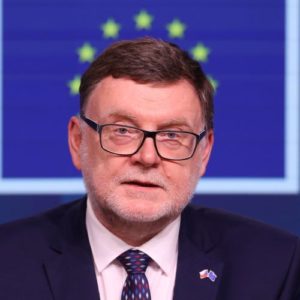 Zbyněk Stanjura Finance Minister of the Czech Republic
Zbyněk Stanjura Finance Minister of the Czech Republic
The main priorities of the Ministry of Finance during the Czech Presidency will be to continue the debate on the reform of fiscal rules and to promote sound and sustainable public finances. We will focus on the continued implementation and flexible disbursement of National Recovery Plans to support Europe’s economic recovery not only after the coronavirus crisis but also in the context of the war in Ukraine. In the tax area, we will discuss the amendment of the Energy Directive and the implementation of the OECD global agreement on the taxation of multinational companies. Last but not least, the MoF will lead negotiations on the EU budget for 2023.
The Government presented the main priorities of the Czech Presidency of the Council of the European Union (CZ PRES), which are the management of the refugee crisis and the post-war reconstruction of Ukraine, energy security and getting rid of dependence on Russian energy resources, strengthening European defence capabilities and cyber security, and the strategic resilience of the European economy and democratic institutions. In addition to these priorities, the Ministry of Finance has published its priorities in the ECOFIN Council, which can be divided into four main areas: economic policy, taxation, the EU budget and financial services.
« The key will be to take over the presidency smoothly from the French, to work with the Commission and Parliament and to continue to moderate discussions on the ongoing European proposals at Ecofin Council meetings. The priority areas for us will definitely be the disbursement of national recovery plans, the return to fiscal discipline, managing the refugee crisis and Europe’s energy security. I also believe that we will soon get to the issue of the reconstruction of post-war Ukraine, which will bring a number of business opportunities, » says Finance Minister Zbyněk Stanjura.
Economic policy
One of the main tasks of CZ PRES in the ECOFIN Council will be to lead discussions on the implementation of the Recovery and Resilience Facility (RRF) and possible revisions of national recovery plans to better accentuate the current economic challenges related to the war in Ukraine. The possibility of greater flexibility in the use of European money from National Recovery Plans would allow for greater involvement of these funds, for example, in the management of the refugee crisis and the integration of refugees into the labour market, the education system and society in general. The Ministry of Finance will also actively engage in debates on reforming fiscal rules. According to the MoF, EU governments should actively reduce their high debt levels, not only from the covid years, and should gradually return to a fiscally responsible policy.
Taxes
In the area of taxation, the MoF will generally strive to simplify the tax system and reduce the number of unjustified tax exemptions. As regards indirect taxes, we will continue to prepare the amendment of the Directive on taxation of energy products and electricity and its adaptation to the current climate targets. By simplifying and modernising VAT rules to better adapt them to the digital age, EU Member States will be able to fight tax evasion more effectively. Regarding direct taxes, following the progress of the French Presidency, the debate on the setting of taxation of the digital economy and the implementation of the OECD global agreement on the taxation of multinational companies in the EU legal framework will be crucial. Further updating of the European list of tax non-cooperative jurisdictions will also be a priority for us.
EU budget
The key task of CZ PRES will be to reach an agreement on the EU budget for 2023 and to negotiate a compromise between the EU Council and the European Parliament. The Czech Republic’s chief negotiator for the 2023 EU budget will be Deputy Minister Jiří Georgiev. The CZ PRES will also discuss the possibility of introducing new EU own resources, which should contribute to the reform of the revenue side of the European budget without having a negative impact on business and economic production. Possible new EU resources include revenues from emission allowances or the so-called carbon duty, which aims to reflect the price of emission allowances in the price of importing goods into Europe. This should prevent energy-intensive production from shifting from Europe to third countries and thus circumventing the EU’s stricter climate rules.
Financial services
In the area of financial services, we will promote the stability of financial markets and ensure adequate consumer protection. We will continue to discuss specific proposals, including the revision of the rules on credit institutions, bank crisis management, the Solvency II insurance directive, the revision of the rules on the financial instruments market and the development of the Capital Markets Union. Of course, a more effective approach to combating money laundering and terrorist financing is also a priority.
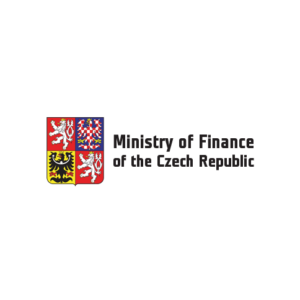
Andrea Ferjenčíková, EIB Group Representative in the Czech Republic
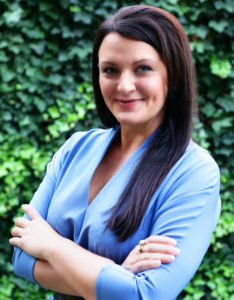 Andrea Ferjenčíková, EIB Group Representative in the Czech Republic
Andrea Ferjenčíková, EIB Group Representative in the Czech Republic
Three decades of the EIB Group’s presence in the Czech Republic
With more than EUR 24 billion invested in the national economy since 1992, this year we are celebrating three decades of being one of the most reliable sources of more affordable long-term financing and advisory support for the Czech Republic. Our investments supported almost all key sectors of the Czech economy – transport, energy, urban development and climate action innovation projects. Since the beginning, we are supporting all segments of the local economy, state, regions, and municipal projects, but also corporates, banks, and SMEs. For illustration, almost one third of our financing (EUR 7.2 billion) has been dedicated to supporting small and midsize companies since 1992 – one of the main sources of employment in the country.
At the heart of each of these projects is to make life and business in Czechia more attractive, efficient, and comfortable. To improve the infrastructure in the country, we have financed projects such as a Prague metroconnection between Dejvice and Motol, an upgrade of the Facilities of the Masaryk University in Brno, construction of a pavilion for the central emergency and acute care in Pardubice Hospital, urban renewal in Pilsen, including the construction of a theatre, which prepared the city to host the EU Capital of Culture, or a reconstruction of the School of Pedagogy in Litomyšl, where the Czech EU Presidency has been launched on July 1st this year.
In the last ten years, the EIB has invested EUR 10 billion in the Czech Republic, with EUR 1.8 billion going toward energy upgrades and EUR 1.3 billion going toward national transportation modernization.
We support the Czech economy and its ecosystem also via our investment arm, the European Investment Fund (EIF). Since its inception, EIF has leveraged more than EUR 6 billion of the investments in the country, especially by providing guarantees, equity, and capacity building investment products to deliver financial support for SMEs and midcaps, mainly via venture capital and private equity funds or commercial banks. The EIF began investing in Czechia in 2002 and has since invested nearly EUR 300 million. A great example of this was last year’s investment in I&I Biotech Fund I, one of the first EIF-supported technology transfer funds across all of CEE, to boost the commercialization of scientific research projects and the EU economy’s competitiveness in biomedicine.
Support brought to Czechia undeniably includes our advisory services. We are able to deploy our global know-how in various fields and to offer it in the region’s only advisory form because we are the leading International financial institution having an internal capacity of hundreds of projects and sectoral experts, engineers, and economists who are evaluating the investments from a technical point of view. As a result, the EIB provides technical advice for the project and investment program planning. In addition, the financial advisory aids local financial players or states in creating financial instruments to better combine and blend different sources of funding, such as grants, loans, and equity.
Additionally in Czechia, we collaborate with our clients – typically at no cost – to ensure that they can generate bankable projects efficiently. One of our advisory services, ELENA, which focuses on soliciting investments in energy efficiency, alone developed projects that will draw EUR 126 million in funding for energy efficiency measures just last year. This assistance is being benefited by the Central Bohemian Region, the Ministry of Trade and Investments, and small municipalities via the National Development Bank’s scheme.
European Investment Bank Group – the Investment arm of the European Union
The EIB, as the Bank of the EU, is owned and governed by the EU Member states, the Czech Minister of Finance is the Member of the EIB’s Board of Governors. Another main task of the Bank is to mobilise and crowd in the investments of the private sector, as we know the investment gaps can’t rely on the shoulders of the taxpayer’s money solely. We are an impact-oriented EU institution, and we support investments in the policy areas that are the priority for the EU family. Hereby, we work very closely with the European Commission, which is entrusting us with various mandates, such as the InvestEU, to enable the EIB to diversify its portfolio of clients and to finance and support EU priorities through the assumption of higher risk. We are not policy makers, but policy takers.
Interestingly, our role is to act and support the economies during the crisis, to play an anticyclical role in the economy. There is no need to look that far back in history to see how the EIB Group’s instruments such as the EFSI – European Fund for Strategic Investments under the Juncker plan, helped to boost the economies after the financial crisis 10 years ago, or the EGF – the pan-European Guarantee Fund, created to help businesses get through the crisis and recover from the economic impact of COVID-19.
Aside from the previously mentioned role of the EIF, we have recently established a new branch of the EIB – EIB Global – dedicated to development finance, to support our activities outside the EU.
EIB Group activities in Czechia – supporting the resilience and economic growth of the Czech Republic in times of crisis
Two years of pandemic and war in Ukraine introduced new elements to our priority list, and we had to ensure support for EU economies and health sectors alike. Since the energy and global food crisis emerged as a direct consequence of the Russian invasion, we found ourselves in an even more complex situation with constantly increasing requests for support.
The EU has been hastening its energy transition plans, including through REPowerEU, where we believe the EIB can assist in meeting these objectives while increasing support for renewables, energy efficiency, and energy innovative projects.
In Czechia, we see more requests from partners looking for help to accelerate the preparation of investment portfolios under energy efficiency programs. Our priorities in the country are to ensure SMEs and mid-caps have access to financing, and to support the modernization of the national green and transport sectors, for the benefit of citizens.
Europe as a Task: Czech EU Presidency priorities and the synergies with the EIB Group
To reflect on the historic message which, alongside “Rethink, Rebuild and Repower” has been adopted as the motto of the Czech Presidency, we can only reiterate that as the Investment arm of the EU, the raison d’etre of the EIB has, since its inception over sixty years ago, been to invest not only in assets but in a common and better future, in the European project and in support of EU’s core values across the globe.
Since the beginning of the Czech Presidency, EIB President Werner Hoyer, senior management, and our experts are actively engaging with the Presidency, participating in the discussions at the Informal ministerials devoted to the climate, energy, and economic resilience topics, which clearly signals the readiness of the EIB to play an instrumental role in these files.
Furthermore, alongside our EU partners and the Presidency, our support and solidarity with Ukraine remain strong. Within three weeks of the invasion, we released EUR 668 million to Ukraine, in May we endorsed the EUR 4 billion package to respond to displaced people’s needs in the regions of the EU, including Czechia, and in summer, approved an additional Ukraine Solidarity package of EUR 1.59 billion. The funds will help the Ukrainian government cover priority short-term financing needs, and ensure urgent repairs of damaged roads, bridges, and railway infrastructure. At the Lugano conference, we announced EIB’s offer to set up an EU-Ukraine Gateway Trust Fund that would form part of the wider EU support for Ukraine’s reconstruction, beyond the horizon of urgent short-term needs.

Andrea Ferjenčíková, EIB Group Representative in the Czech Republic
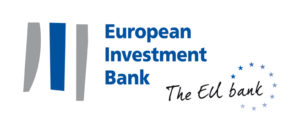
Jozef Síkela, Minister of Industry and Trade
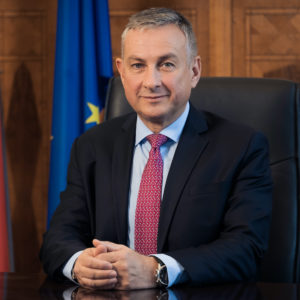
Jozef Síkela, Minister of Industry and Trade
Can you briefly introduce us the Ministry of Industry and Trade?
The Ministry of Industry and Trade (MIT) is the central state administration body for industrial, energy and raw materials policies, trade policy in the context of the EU Internal Market, pro-export policy, consumer rights protection, support for small and medium-sized enterprises (SMEs), postal services, electronic communication and digitization policy and technical harmonization/standardization.
What are your priorities for the Presidency?
Priorities of my Ministry for the Czech Presidency are clear – first, we need to ensure greater energy security. Our long-term dependence on the import of Russian oil and gas is no longer sustainable. Improving the energy security of the EU became even more relevant after the Russia’s invasion of Ukraine and its repeated attempts to use its energy supplies as a weapon against the EU. We are doing the best we can to diversify EU energy sources and improving energy savings in order to enhance the energy autonomy of the EU. For that reason, on 26 July, the Czech Presidency called for an extraordinary Energy Council in Brussels where the EU Member States agreed on a 15 % energy savings target and a creation of a winter alert system enabling mandatory cuts in the natural gas consumption.
Furthermore, we recognize the importance of the REPowerEU Plan and the future implementation of the Fit for 55 package. It is very important to us to put emphasis on promoting the energy efficiency and energy savings, and supporting the deployment of renewable technologies. We also need to focus on the development of low-emission energy infrastructure, including the nuclear and hydrogen energy, and on energy diplomacy and cooperation with reliable partners.
Moreover, the Czech Presidency will focus on building up the EU economy’s strategic resilience. Over the years, the EU has developed an unsustainable dependency on third countries in key products, such as pharmaceuticals, chips, cloud and raw materials. To remedy this, we need first to analyze our dependencies carefully and then enhance the local production, strengthen our circular economy and diversify our trade partners, especially from among the democratic and reliable ones.
Last but not least, it is a priority for the Czech Presidency to support Ukraine in its fight against Russian invader, in its gradual integration into the EU and in rebuilding its industry
Could you present the Industry and Trade economic area and the perspectives of development? The role of environment and digitalization?
The Czech Presidency believes that digitization is a crucial aspect in achieving competitiveness of the EU. In our understanding, a fundamental prerequisite for a successful digital transformation is the promotion of a favourable environment for innovations, investment in disruptive technologies, the development of technological capabilities and skills and facilitating the development of a dynamic data economy. We consider SMEs as the main drivers of innovation and we are striving to increase their competences and development in the digital field.
From the perspective of funding, the Czech Republic fully supports development of the digital innovation hubs (so called EDIHs), which should be operational by the end of 2022. These facilities aim to provide the best support through the exchange of expertise, experience and know-how. In addition, they will serve as enablers of digital transformation (in a field of artificial intelligence, high performance computing or cyber security), enabling SMEs to test and use digital technologies.
During our Presidency, we are also closely following the negotiations of several important digital files, which will help with the digital and environmental transformation. For example, the Data Act will facilitate the establishment of a data-sharing ecosystem and also help with the creation of green deal data space.
When it comes to the sphere of digital trade, the Czech Presidency seeks to promote open strategic autonomy and cooperation with countries such as the USA, Israel, Switzerland, Japan and the UK to maintain fair competition, resilience and innovation in the European economy. We are convinced that the importance of digital trade will only increase. At the same time, we see that open digital trade and ensuring data security are not in contradiction. Nevertheless, we are worried about the growing tendencies towards digital protectionism in the world and believe the EU should lead by example in fighting those tendencies.
Could you give us an idea about the important sector, the international collaboration and the most important Czech companies who play a strategic role?
The Czech Republic is one of the most industrialised countries in Europe. As a country with a high dependence on manufacturing industry, digitization and the development of modern technologies is naturally a must. This will give us a comparative advantage in important sectors that are dynamically changing the environment of our industry, energy sector, trade and logistics.
The most important sectors include the engineering, automotive, chemical, steel, electrotechnical or defence industries. Since the individual sectors of the manufacturing industry are complementary and have the potential to create a synergistic effect with other ones and thus higher added value in the entire group, it is necessary to support them all. Together with digital technologies, data processing and specialised R&D in the field of digitization, they provide the Czech Republic with significant potential for export and international cooperation.
The Czech Republic actively partakes in a number of important projects dealing with development of new services, technologies and materials, enhancement of the level of automation and robotics and the use of digital technologies. In this context, I mention our active participation in Important Projects of Common European Interest (IPCEI) in the fields of hydrogen technologies, microelectronics and data processing – cloud storage.
One of the main priorities of the Czech Presidency is a strategic resilience of the European industry, where our focus is among others on raw materials and components supply chains. Therefore, we pay a great attention to the legislative proposal for strengthening the Europe’s semiconductor ecosystem, the so-called Chips Act.
It is very difficult to name just a few companies as many of them play a strategic role and contribute to the performance of our economy. The fields and sectors where these companies operate are, for example, the automotive, aerospace, advanced manufacturing, metallurgical industry, machine tools engineering, electrotechnical industry, microelectronics, chemical industry, nuclear engineering, 3D printing, nanotechnologies, ICT and many others.
What are the major challenges for the Ministry of Industry and Trade in the national and international area in the world of today and tomorrow?
In our opinion, ensuring the energy security and mitigating the volatility of energy prices to the extent possible is the most important global challenge of our time. We clearly see that the term of energy poverty threatens to became a reality. Unfortunately, there are only limited possibilities to take action, because the current development of energy prices on global markets is hardly predictable and an extreme price volatility breaks any boundaries we have ever experienced. Despite this, we must do what we can to reduce its negative impact on end consumers.
Russia turned out not to be a reliable energy supplier and, we need to prepare ourselves for further interruptions in Russian gas supplies. Therefore, we need to not only diversify our energy imports, but also lower our energy consumption as much as possible, as already aforementioned.
Finally, we shall continue in our progress in strengthening the energy security of generation capacity and deployment of sustainable and secure sources.
In the context of environmental and climate protection as well as the current energy crisis, we are facing a fundamental challenge in the field of green transition of industry and energy. This is closely related to what I have already stated as one of the Czech Presidency priorities – building the strategic resilience of the EU economy. Ensuring raw material and energy security only underlines the need to actively promote the green transition. Therefore, the transition to a circular economy and sustainable use of resources, reducing the energy and raw material consumption in industry, transition to non-fossil energy sources or the adaptation of industry to climate change are essential for maintaining the competitive and strong Europe.

Mr. Vladimír Dlouhý, President of The Czech Chamber of Commerce & Deputy President of EUROCHAMBRES
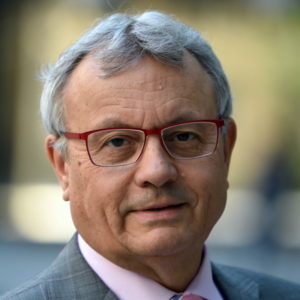 Vladimír Dlouhý, President of The Czech Chamber of Commerce & Deputy President of EUROCHAMBRES
Vladimír Dlouhý, President of The Czech Chamber of Commerce & Deputy President of EUROCHAMBRES
Journal Général de l’Europe (JGDE): Can you briefly introduce us to the Czech Chamber of Commerce?
Vladimír Dlouhý (VD): The Czech Chamber of Commerce is the only representative of business community in the Czech Republic which was established by a special chamber law. Membership is non-compulsory and currently we have over 16 thousand members. Main chamber’s mission is defending interests of the Czech business community through discussions with key players on national as well as regional level, government and state officials. We also comment on new business-related legislation and with all our activities we help create the most favourable business environment in our country. As full members of EUROCHAMBRES we get involved in EU and international projects and policies.
JGDE: What is your responsibility like Deputy President of EUROCHAMBRES in Brussels?
VD: I chair Sustainable Europe committee that drafts positions to European initiatives in the field of climate issues and energy, and in my capacity I discuss these positions with Commissioners, the Council and EMPs. As all vicepresidents, I also provide support to the EUROCHAMBRES President Luc Frieden with representing and promoting the European chamber network.
JGDE: What are your priorities for the Czech Presidency?
VD: We summerized the entrepreneurial priorities of the Czech Presidency in a document that was presented to public and the Czech government. The main points are energy security and self-sufficiency, mitigation of bureaucratic burden of enterprises and improvement of the EU Single Market conditions as well as support of digitalization and investment into the added value.
JGDE: Could you present the economic area and the perspectives of development? The role of energy, environment, and digitalization?
VD: The Czech Republic is an open economy with advanced industry and services, it has a high potential to become a technological leader not only in the Central Europe. Czechia’s great advantage is its self-sufficiency in energy production (albeit suffering with gas shortage in case the stoppage of Russian deliveries), relatively small level of indebtedness and political stability. That is why the country is an attractive destination for foreign investors and development of new technologies.
JGDE: Could you give us an idea about the important sector in Czechia and the international collaboration?
VD: Undoubtedly, the main role in the Czech economy plays the automotive industry. However, this sector is expected to undergo substantial changes in the next years with relation to the Green Deal, fights with climate change and growing importance of electromobility. It is critical to follow this trend and make Czechia a technological centre, particularly for development of batteries and other related projects. Nevertheless, for a long time we have been warning that the current European policy in the field of climate change fight is very precipitous and does not reflect regional differences not only in electromobility, but in energy sector as such.
JGDE: What are the major challenges for entrepreneurial sector in the national and international area in the world of today and tomorrow?
VD: European countries prioritize reduction of energy dependence on imports from Russia, particularly gas. With upcoming winter it will be even more crucial to fill the gas storing facilities in each country and at the same time negotiate gas imports from alternative sources, or increase the LNG capacities, like the Czech government and the energy company ČEZ did in co-operation with the Netherlands. Long-term objectives should be the technological development of economies and investment in digitalization as well as increasing the added value in manufacturing. Important challenge also is the reduction of bureaucratic burden which remains still high in the Czech Republic.
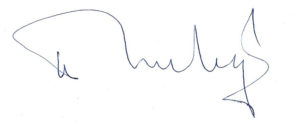

Mr. Jaroslav Hanák, President of The Confederation of Industry of the Czech Republic
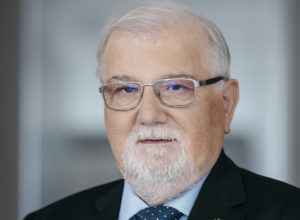 Mr. Jaroslav Hanák, President of The Confederation of Industry of the Czech Republic
Mr. Jaroslav Hanák, President of The Confederation of Industry of the Czech Republic
Can you briefly introduce us to The Confederation of Industry of the Czech Republic?
The Confederation of Industry is the largest and most influential independent employers’ and business umbrella organisation in the Czech Republic representing more than 11,000 companies that employ over 1.3 million people. We are a respected social partner both at the national and European level and a leader of the employers’ representation in the tripartite body, the Council of Economic and Social Agreement of the Czech Republic. Our key role is to defend and advocate the common interests of our members and speak for companies of all sectors and sizes including SMEs.
Our main goal is to promote the economic and social conditions in which businesses operating at the national and EU levels can prosper, create jobs, and stay competitive. We believe that all citizens in the Czech Republic and the EU can benefit from our efforts and the success of our companies.
As a member of the European business community – BusinessEurope, the Confederation participates in several advisory bodies and agencies of the European Commission, contributing to the development of the EU policies and legislative processes. Since 1996 we have been the first of the SVEs unions to be a member of BIAC (Business at OECD) influencing OECD international initiatives. We are proud of our strong presence in Brussels, both through our own office, led by our permanent delegate to BusinessEurope, and within the joint Czech Business Representation to the EU (CEBRE).
What are your priorities for the Czech Presidency?
The priorities we set for CZ PRES earlier this year remain valid, and they are employers’ basic principles and attitudes in key areas. However, the current situation associated with the ongoing Covid pandemics and Russia’s invasion of Ukraine must be approached in different time horizons – from short-term to long-term towards structural reforms. We also find it essential not to allow the current adverse situation to rewind the tape of what we have reached in the EU. Nevertheless, our goals and strategies need to be considered in terms of their clarity, feasibility and loyalty to European grassroots and founding principles.
In the Czech business priorities for the second half of 2022, you will thus find an emphasis on competitiveness, pro-growth and resilience measures, openness, cooperation, and increased flexibility. Peace, legal certainty, and respect for fundamental human rights are essential prerequisites of life in Europe. We see all these factors as a precondition for Europe’s successful economic and social recovery and for becoming even stronger in the future.
For example, one of our priorities is called « a resilient and open Europe ». A critical prerequisite for its achievement is to support an ambitious EU trade policy and effective multilateralism. To get there, we need to promote strategic partnerships with like-minded countries, emphasising transatlantic cooperation. It is necessary to focus, among others, on securing safe international data transmission and collaboration in advanced modern technology.
Could you present the economic area and the perspectives of development? The role of energy, environment, and digitalisation?
The EU economy is facing a challenging period. Whilst some services sectors continue to benefit from reopening of the economy after the pandemics, many industrial sectors have seen output hit by continuing global supply chain disruptions and have been suffering due to rising energy and raw material prices. We will all need to be vigilant to the growth of inflationary expectations, with social partners engaging responsibly in collective bargaining on wages to help ensure that temporary price rises do not give rise to a damaging wage-price spiral.
We need to find a proper balance between controlling inflation and the need to support recovery while avoiding recessive effects. The suspension of the rules of the Stability and Growth Pact in 2023 as a consequence of the increased short-term government spending requirements related to the war in Ukraine must not delay the long-term strengthening of public finances. It remains essential to make the best use of the EU’s Recovery and Resilience facility to drive productive investment and reform. In addition, an ambitious industrial policy is the best way to strengthen European businesses’ innovation and global competitiveness. Improving the business environment is critical to support companies without adding to public debt.
The EU policymakers should strengthen the EU Single Market, removing barriers to trade and investment, particularly in energy, digital, banking and capital markets and should pursue an ambitious trade policy whilst diversifying sources of supply.
To tackle skyrocketing energy prices, we support the Czech Presidency to ensure appropriate financial compensation for businesses, create the right investment conditions for more renewable and low-carbon energy and fuels, besides intensifying the diversification of supply routes and taking a realistic approach to phasing out the dependency on Russian energy sources.
In the green transition and the negotiations on the Fit-for-55 package, the Czech Presidency should ensure that the green transition is economically and socially workable and successfully move the EU towards a more sustainable economy while reinforcing our European competitiveness and global technology innovation leadership.
To strengthen our Single Market and accelerate its digitalisation, the Czech Presidency must pursue the protection of the Single Market freedoms not only in negotiations on the upcoming Single Market Emergency Instrument that will address crisis situations, but in all the proposals setting new requirements for products and services in Europe as well as in the initiatives on data economy, AI and cybersecurity.
Could you give us an idea about the important industrial sector in the Czech Republic and the international collaboration?
Although very ambitious, our goal is to contribute to an economic transformation that the Czech economy must undergo. We need to get rid of a cheap supply-oriented economy to stay globally competitive and catch up with advanced economies.
Constituting around one-third of all Czech exports, the automotive sector is a crucial one. The Czech Republic not only ranks second in the world in car production per capita, but it is also an important supplier of car parts to the German automotive industry.
In the current tense geopolitical context with Russia’s invasion of Ukraine, we support the efforts to strengthen the EU economy’s resilience by building coalitions with like-minded partners, diversifying sources of supply and accelerating ratification of negotiated bilateral free trade agreements.
International success requires attention to employment and social policy as well as workable requirements for companies. Given the tight labour markets with record levels of vacancies and skill shortages, the focus needs to be on labour force and skills shortages. A balanced approach is needed on key files, including platform work and pay transparency. The principles of subsidiarity and proportionality must be respected, as well as national practices and social partners’ autonomy. On top, all ongoing initiatives must fit together, be SME-friendly without overlaps and reduction of resources available to companies to deal with the current crisis. Moreover, the EU rules on due diligence must be effective, workable, and proportionate while providing a true level playing field.
What are the major challenges for Czech Industry in the national and international area in the world of today and tomorrow?
Even in this critical situation – or because of it – we should not forget some of the necessary reforms needed in Europe, which would take us towards dynamic labour markets. A lot must be done to reduce skills mismatches by reskilling, upskilling, or adult education to ensure the sustainable competitiveness of our companies, and smooth green and digital transition.
In the current environment, all social partners on the national and EU levels need to lead a constructive dialogue and deliver on their expected and respected roles. It is not only on the governments but also representatives of the employees, employers, and various non-governmental organisations to orchestrate meaningful actions.
It is important to review the impact of the war in Ukraine, especially the way forward in view of the EU sanctions as a response to Russia’s aggression.
Also important to our industry are the initiatives the EU has launched aimed at restoring a level playing field and countering market distortive practices of our trading partners – the Instrument on Foreign Subsidies, the Anti-Coercion Instrument, and the International Procurement Instrument. They will help us effectively defend ourselves against unfair trading practices. As the Czech Republic is an export-oriented economy, ensuring a level playing field in the world trade will increase export opportunities for our companies
Mr. Jaroslav Hanák, President of The Confederation of Industry of the Czech Republic

Ivan Souček – director of the Association of the Chemical Industry of the Czech Republic: Main challenges for the Czech chemical industry in 2022
Main challenges for the Czech chemical industry in 2022
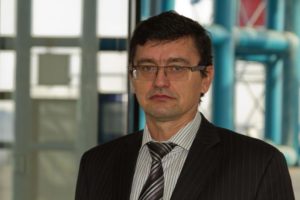
The year 2022 started with promising development of economy after 2019-2020 COVID pandemic recovery. Already year 2021 recorded results which indicated return to the industry position and role prior 2019. According Raiffeisen Bank reports, for the whole of 2021, the economy in real terms grew by 3.3%. The main factor was the recovery in domestic demand and the build-up of inventories. Nevertheless, the significant increase of the energy prices (natural gas and electricity) in the 4th quarter 2021 pushed optimistic view back. Currently, consumer spending is falling back below pre-pandemic levels due to high inflation and a deterioration in expected economic developments. The solid result in the end of 2021 provided the economy with a springboard for this year, the war in Ukraine, high inflation and a more aggressive approach of the main central banks (especially the Fed and the ECB) are changing the macroeconomic situation substantially having threat of COVID another new wave ahead of us.
The chemical industry is a very important producer of intermediates which are an integral part of the production of a wide range of end products. Polyethylene, PET and other polymers, benzene, propylene, nitric acid and epoxies – these and many others are important products, especially for the automotive, agricultural, construction, packaging and other industries. The Czech chemical industry is accounting for 13-14% of value added in the domestic manufacturing industry, directly employing almost 56 000 people (with another 100 000 in plastic and rubber processing industries and another few hundred thousands people serving those industries) is also very strongly interlinked with other sectors of the manufacturing industry and agriculture.
Manufacturing in this segment is very energy intensive. In particular, electricity, oil or natural gas are not only part of typical overhead costs or energy consumption, but oil and natural gas also represent basic input raw materials for the production of chemical products.
The chemical industry has the following challenges ahead of this year:
- Being energy intensive industry: high energy prices has impact on production cost, final price of the product followed by decrease of the demand.
- Being energy intensive industry: access to the basic energy sources is crucial to assure continuous operation. Disruption to the supply of any energy input in the chemical sector would have a cascading effect across the other sectors with which the chemical industry is intertwined.
- Being energy intensive industry: decarbonisation will mean significant transformation of the sector (even goals Fit for 55 will be achieved by continuous improvement of the operation energy intensiveness since 1990)
- Being on of the innovative industry: new challenges connected with decarbonisation are foreseen. The CCU (Carbon Capture and Utilisation) technologies will bring replacement of the fossil sources for production organic materials. Hydrogen as one of possible component for CO2 conversion is another opportunity taking into account not only green hydrogen but also hydrogen produced as by-product during chemical synthesis of desired substances.
- Regardless of macroeconomic, business and market related issues the EU continues to achieve goals defined in EGD package. Number of final legislative acts are supposed to be discussed during the Czech Presidency to EU Council in 2H 2022 such as RED III, Energy Efficiency, number of acts related to Circular Economy, CLP, REACH, CBAM, Revision of the EU Emission Trading System, including revision of the EU ETS Directive concerning aviation, maritime and CORSIA, Effort Sharing Regulation, Revision of the Regulation on the Inclusion of GHG emissions and removals from land use change and forestry (LULUCF).
Rising energy prices, combined with high pressure on energy decarbonisation and reduction of energy dependence on Russian energy supplies represent a mix of factors that have an immediate impact on the performance of many sectors of the domestic economy. Given the Czech Republic’s high level of dependence on Russian supplies of natural gas and oil, energy-intensive industries (including the chemical industry) are facing the highest risk at the moment. Given the fact that products of the chemical industry represent a significant share of the total cost of production in a number of closely related industries, it can be assumed that any rising prices of chemical inputs will also be reflected in the production of many common products or services. The performance of the chemical industry will depend not only on energy prices but also on the availability of key raw materials.
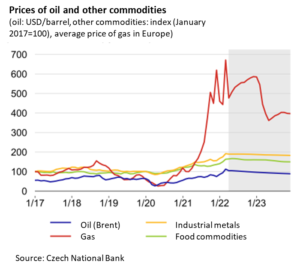
In the context of the current development of energy prices combined with the pressure to decarbonise and reduce energy dependence on Russian supplies, it is now desirable to respond flexibly and set up an appropriate government compensation schemes that will support the continuity of the long-term competitiveness of the Czech chemical industry as already applied in many other countries of EU.
Ivan Souček – director of the Association of the Chemical Industry of the Czech Republic

Mr. Richard PAVLICA, President of the Czech Space Alliance (CSA)
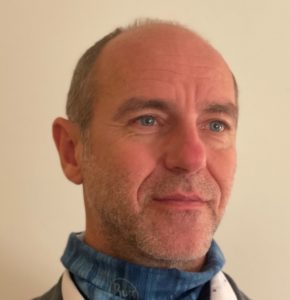 Mr. Richard PAVLICA, President of the Czech Space Alliance (CSA)
Mr. Richard PAVLICA, President of the Czech Space Alliance (CSA)
1/ Can you briefly introduce us to The CSA and your missions?
The Czech Space Alliance (CSA) is an industry association of, and for, Czech space companies with proven skills and track record in aerospace business, and with broad international client base. The alliance was established in 2006 to present the skills of its members at national and international events and establish dialogue and relationship with similar associations and space agencies, be they in Europe or beyond; help its members to develop business relationship with potential partners in other European Space Agency members states and beyond. Important part of our mission is to represent and to promote the interests of the space industry to the national decision makers, the media and other relevant associations or entities; co-operate with the ministries and all other official entities supporting space activities in the formulation of space policy and creation of suitable conditions for the growth of the space industry.
2/ What are your priorities for the Czech Presidency?
Czech Space Alliance main role is to promote Czech Space Industry Capabilities during Czech Presidency and support picture of Czech Republic as state of highly skilled and educated people. CSA represents Czech Space industry and its successes at all main events in Europe such as IAC, EU Space Week or Space Tech. Another target is promotion of Czech EU Presidency within Space community around world through CSA traditional presence at international events as in JAPAN or SAE.
3/ Could you present the perspectives of development? And the different sector concerned? Could you take some examples?
CSA covers by its members practically all sectors of Space applications. Beginning of Czech industry involvement to Space applications were single component and services even at excellent level.
 BBT_Calomel based Glan-Foucault polarizer for infrared region
BBT_Calomel based Glan-Foucault polarizer for infrared region
Good example is infrared polarization optics based on the world unique calomel crytals developed at BBT-Materials Processing or new polymeric material development performed by TOSEDA such pastes and pads for NEOSAT with very high thermal conductivity, and transparent polyimide films for thermo-optical applications.
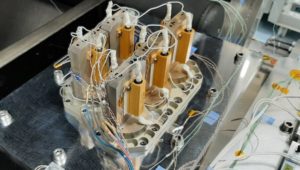 TOSEDA Foto – Testing of TOSEDA thermally conductive paste at TAS France
TOSEDA Foto – Testing of TOSEDA thermally conductive paste at TAS France
Electronics manufacturing is another remarkable industrial sector: Space missions as JUCIE or Solar Orbiter contained electronics made by CSRC division of BD SENSORS for more than 25 years.
By the time, members of CSA increased competences and increase complexity of their products and involvement to supply chain of the most important Space players in the world such as Thales Alenia Space (TAS) or Airbus Defence and Space. Good example is cooperation of CSA member Frentech Aerospace with TAS France on development and supply of hinges for solar panel of Iridium NEXT.
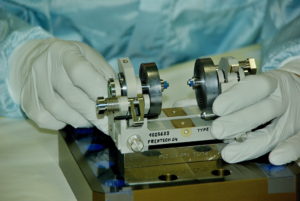 Frentech_hinge
Frentech_hinge
Czech industry is not only manufacturing but also design activities represented f.e. by CSA member L.K.Engineering whose design activities were involve in plenty of Space projects for last 10 year as current design of Magnetic diverter for Athena mission.
CSA role is to promote communication between all our members what brings closer cooperation of companies and also new challenges not only within Alliance.
Another role of CSA is very close interaction with Czech Delegation to organize support to promising ideas brought by CSA members.
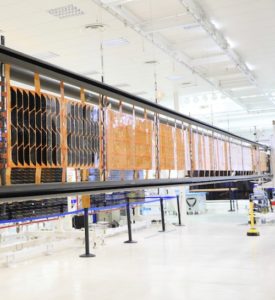 Flexible Solar Array down scale model
Flexible Solar Array down scale model
Excellent example of such a successful cooperation of CSA members very effectively supported by CZ Delegation is start of cooperation with TAS France on development of mechanical subsystem for Flexible solar arrays. Original cooperation of 5M as prime with Frentech Aerospace and L.K.Engineering responsible for design on original agreed subsystem perimeter leaded to step by step increase of complexity of work performed by Czech companies, which induced need of additional competencies as f.e. electronic component, which brings opportunity of an involvement of other members of alliance as BD SENSORS with harnesses and connectors. Finally complete structure and mechanism of Flexible Solar Array is developed by Czech companies and due to that concept of Flexible Solar Array was include as the essential part of new TAS telecom platform developed with ESA project NOVACOM II.
This template encourages CSA to promote even more complex products such as subsystem driven by SW to involve Czech SW excellent development capabilities, which are presented by Alliance member esc Aerospace who holds flag of Czech reliable SW for more than 20 years. Good examples are on-board software for STIX (Spectrometer Telescope for Imaging X rays) at Solar Orbiter mission, and other fleets as TRITON-X heavy platform, QKDSat, ExoMars, SWARM, SENTINEL-4, MTG, or MetOp-SG.
First steps to validate this direction were done on Cubesats such as BDSat or cooperation with research institutions out of CSA on VZLUSAT 1. New project ideas appeared based on small system successful cooperation, which are promoted by ESA program of Czech ambitious projects. Within this opportunity there were defined challenging projects inducing cooperation across whole Czech Space society. We are proud that members of Czech Space Alliance are leaders of about 60% of all projects already launched within this program. Outputs of project are supposed to brings commercially attractive final Space systems and applications.
CSA final destination is to be a platform for communication of government with all main industrial players at field of Space application in Czech Republic and built picture of Czech Space Industry as strong and reliable partner.
4/ What are the major challenges for The CSA in the national and international area in the world of today and tomorrow?
The current very complicated international situation brings necessity to change priorities in budget of each European state especially national budget saving are priority. Main challenge is to convince not only Czech government that even if savings in budget are essential, it should not be reduced support of development and high-tech applications, where Space is basic part but on contrary to this use technologies and development to increase efficiency of government processes as well industry and achieve necessary saving, which is possible also in very close time horizon. It is necessary to invest to development and high-tech application to achieve this goal.
Main challenge internationally is to significantly increase Czech Space Industry successes visibility, intensify and expand CSA connections to other European space associations and clusters to be an integral and traditional part of European space environment.
 Mr. Richard PAVLICA, President of the Czech Space Alliance (CSA)
Mr. Richard PAVLICA, President of the Czech Space Alliance (CSA)
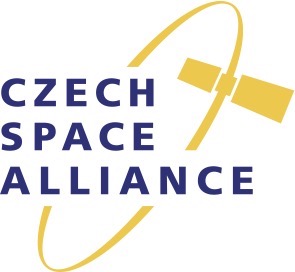
Michal Fleischmann Ambassador of the Czech Republic to France
The Czech Republic has always been at the heart of Europe.
 Michal Fleischmann, Ambassador of the Czech Republic to France
Michal Fleischmann, Ambassador of the Czech Republic to France
The virtual transfer of the torch» of the French Presidency of the EU Council and the Czech Republic in Paris took place on the 30th. June on the Trocadéro esplanade with behind the Eiffel Tower illuminated in blue. The Minister of Culture Rima Abdul-Malak and the Minister Delegate for Europe Clément Beaune, who were present, have kindly signed the book Le tour de l’Europe, where a writer from each country presents a short story presenting his share of the European experience. The dedications called for courage, friendship and unity in the European Union.
On July 4, we launched the Presidency with a concert at the Church of Saint Eustache in the centre of Paris, in what was called «the belly of Paris». The sopranist Lucie Silkenová of the National Theatre, accompanied by one of the most famous organists, Vladimír Roubal, illuminated Saint Eustache with French and Czech composers, from Gounot to Fauré and arriving in Martinů, Dvořák and Leoš Janáček.
In order to present the Czech priorities, the Senate Committee on European Affairs, as well as the University Council of Paris at the Sorbonne, opened the doors. On 12 July at the Museum of Modern Art of the City of Paris, in front of the huge painting of Delaunay, in the colors of the logo of the Czech Presidency, Mrs Catherine Colonna, Minister of Europe and Foreign Affairs, made us the honor to preside the opening breakfast of the Czech Presidency in France together with the ambassadors of all countries of the EU. Fabrice Hergott, director of MaM, then took us on a tour of the exhibition of the Czech and French painter Toyen, the «baroness» of surrealism as André Breton called it.
A festive atmosphere and a deep friendship between our two countries. But there is war, there is war in Ukraine, Russia attacks Europe. Listening to Minister Catherine Colonna, I am a man of radio, I could see how France and the Czech Republic are «on the same wavelength». We also want to end the war and do everything we can to rebuild Ukraine. The Czech Republic is committed to this and will submit to the EU ideas and advances for an EU that is always united and unwavering in the face of the cruelty of an unjustified occupation by Russia of Eastern Europe. Together, we have seen that after February 24, 2022, nothing will be the same. We agreed on the need to ask ourselves the question of reshaping the basics of our structures, not only within the EU but globally. The war in Europe, in Ukraine, has highlighted the existing and potential gaps, imbalances and dangers. The war also showed the formidable and unique unity of free countries in the face of the aggressor. France has strongly advanced and helped to set up the EU’s unequivocal response to Russia. The Czech Republic will do the same and move in the same direction, deepening our no to Russia, deepening European unity and proposing to the EU ideas and solutions to be discussed and implemented. The end of the war, the refugee crisis, the reconstruction of Ukraine, the solutions to the problems thus created such as those of energy, defence, economy. Together with France and all EU countries we must strengthen our democracies and the rule of law. This is our life, we have to face the facts.
The Czech Republic, often in the past alone in the face of terror, is today just behind the French Presidency of the Council of the EU at the head of this same Council. It’s a game changer.
It makes me think that already in the 15th century, the King of Boheme Georges de Podiebrady (as Georges Sand wrote) tried to find understanding among the great ones of the time, including the King of France Louis XI, when he proposed a «Agreement for the establishment of peace in the whole of Christianity» in the face of the danger coming from the East (of the Turks at the time). While being wary of the anachronisms that Georges de Podiebrady proposed to «westerners»? A General Assembly bringing together the representatives of the European countries, a Council of Sovereigns, an international tribunal, a common European fund, a common currency, a Unified Law for all the members of the organisation and, in the end, a common emblem. Never seen it before. Today a reality and a necessity. Georges de Podiebrady did not find an echo for his project. Failure or good basis for the Czech Presidency. In any case, we are still talking about it today.
The Czech Republic and France have a long history and each era has its own realities and its own way of reading and thinking about its time. What we know today is that we have within the EU in these historical times, a same reading, we are on the «same wavelength». France and now the Czech Republic, humbly, “at the helm” of the EU Council and under the slogan of Václav Havel, “Europe as mission – to rethink, rebuild, strengthen Europe” have a responsibility that they assume and live.
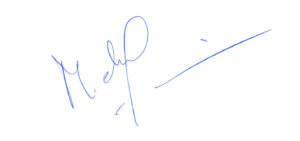
Michal Fleischmann, Ambassador of the Czech Republic to France

French Ambassador in Czechia Alexis Dutertre
2022, a Franco-Czech year for Europe
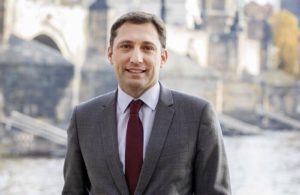 French Ambassador in Czechia Alexis Dutertre
French Ambassador in Czechia Alexis Dutertre
Although relations between France and the Czech Republic are ancient, the partnership between our two countries has been amplified, immeasurably, by the succession of our presidencies of the Council of the European Union in 2022. We have never worked together as much as during what I would call this Franco-Czech year for Europe.
This was the case in Brussels last year, as part of the preparation of the program for the trio of presidencies, which will end with the Swedish presidency in the first half of 2023. Our teams have worked, throughout the first half, to to advance an ambitious agenda of European sovereignty around the triptych « recovery, power, belonging », before facing, in exceptional unity, the consequences of Russian military aggression in Ukraine. France was able to count on the Czech Republic as a reliable partner.
This has also been the case since the beginning of this year here in Prague: during the French presidency of the Council of the European Union, our embassy in Prague organized or carried out more than sixty events or actions to embody and promote this presidency and the European dimension that connects us. France has been able to rely, in addition to its embassy, on the French Institute in Prague, the French Lycée in Prague, CEFRES, the Franco-Czech Chamber of Commerce, France’s foreign trade advisers, our six alliances françaises, as well as on the French associative and entrepreneurial fabric present in Prague. France has passed the torch, but we can build together in the Czech Republic on what we have achieved this semester.
The French presidency was an opportunity to affirm European unity in the face of Russian military aggression in Ukraine, with a suite of six sets of robust sanctions as well as significant financial, humanitarian and fight against impunity support in the face of the war crimes committed. For the first time, in this respect, the European Union has used the European Peace Facility (EFF), to the tune of 2 billion euros, for the benefit of a non-member country, Ukraine, to can arm itself against the Russian invasion. This massive support for Ukraine, including for the reception of refugees in Europe, found its logical follow-up in June in the decision to grant the status of candidate to the European Union, supported by the French presidency.
But we have also decisively advanced the instruments for asserting a more sovereign, less naive Europe, capable of defining and defending its own interests, by and for itself. We have seen very concretely that the European Union is our common good, that European construction is what increases our nations, in a world that is now more brutal and marked by the return of strategic competition between powers. The work on the adoption of instruments of regulation, protection and fair competition was concretized under the French presidency, with the regulations on the markets and digital services with regard to the large platforms, with a strengthening of political governance of the Schengen area and a first agreement on the asylum and migration pact to strengthen the EU’s external borders, with convergence on adequate minimum wages and the place of women on the boards of directors of listed companies, with tools of fair competition such as the anti-subsidy instrument from third countries and the instrument of reciprocity in access to public contracts in third countries, or even with the adoption of the EU’s « strategic compass », which constitutes the first real “white paper” on European defence.
We have also made significant progress on the challenges of energy transition and independence. The French presidency obtained agreements within the Council on key elements of the package to reduce greenhouse gas emissions by 55% by 2030, known as « fit for 55 », in particular on the carbon adjustment at borders and the end of the marketing of combustion engine vehicles by 2035. The war in Ukraine and dependence on Russian hydrocarbons has shown in a striking and irrefutable way the importance of a Europe which is master of its energy sources, in compliance with our climate commitments. This is particularly the meaning of the actions carried out in close cooperation with the Czech Republic to successfully include nuclear energy in the recognized energies of the European taxonomy of sustainable investments.
We have great ambitions for the future of Europe. During his speech on May 9 in the European Parliament to conclude the conference on the future of Europe, the President of the Republic outlined the prospects for preparing us to move towards a Europe of 30 or 35 Member States. This implies preparing an EU capable of being effective in its decision-making, which in our view justifies an extension of qualified majority voting, for example for taxation and external relations. This also implies progress on the EU’s new own resources. This also requires ensuring the rigor of the EU enlargement process to consolidate the acquis communautaire. Finally, this requires ensuring the support of citizens, by taking up their proposals and ensuring the tools to protect our democracy and our freedoms. Finally, the President of the Republic proposed the idea of a « European political community », which would complement the enlargement process and would bring together European states that share our values, members and non-members of the EU, both for political dialogue as well as for concrete projects, on energy, infrastructures and interconnections, mobility of young people, with the objective of giving concrete benefits to the citizens of Europe of what belonging to Europe is. One of these cardinal values is respect for the rule of law, and we are delighted to see that this issue is one of the priorities on the agenda of the Czech Presidency of the Council.
Thanks to Vaclav Havel, we know that „Europe is a duty“, this formula having been taken up as the motto of the Czech Presidency of the Council of the EU. Our successive presidencies show us that the European Union is more than that: it is also a unique bond between us, and an opportunity, for France and for the Czech Republic, during this Franco-Czech year for Europe and beyond !

French Ambassador in Czechia Alexis Dutertre
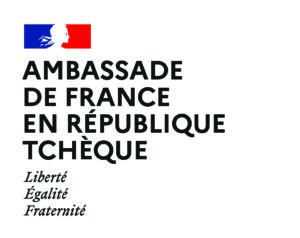
Roman ZDEBOR, Branch Managing Director, EDF Nuclear Czechia
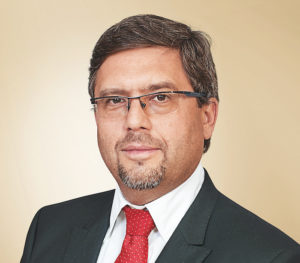 Roman ZDEBOR, Branch Managing Director, EDF Nuclear Czechia
Roman ZDEBOR, Branch Managing Director, EDF Nuclear Czechia
Can you briefly present yourself and introduce us to EDF Nuclear Czechia? Its missions and objectives?
My name is Roman Zdebor and since June 2022 I am the Branch Managing Director of EDF Nuclear Czechia.
In the almost 30 years of experience in the nuclear industry, mainly associated with ŠKODA JS a.s., I have held a number of positions ranging from commercial activities on the Paks nuclear power plants in Hungary and Kozloduy in Bulgaria, through last almost two decades in the positions of Quality Director and New Nuclear Power Resources Director. During my time at ŠKODA JS, I also had the experience of working with the French nuclear industry, in particular with Framatome and EDF, during the implementation of the Olkiluoto, Taishan and Flamanville EPR construction projects. I personally participated in the preparation of the ŠKODA Alliance’s Czech bid for the completion of the Belene NPP. And from 2009 to 2011, I led the team responsible for the qualification of the consortium that applied for the construction of the Temelín 3 and 4 nuclear power plants. More recently, I worked as a project manager responsible for Construction readiness at Hanhikivi NPP in Finland.
Earlier this year I decided to join EDF as the Managing Director of its new branch in Prague. The opening of our Prague offices, in the heart of Europe, marks an acceleration of EDF’s ambition to build strong working relationships and partnerships with ČEZ and our Czech industrial partners and suppliers, while the company has been working since 2016 intensively to support the launch of the Czech nuclear new build program, especially for Dukovany 5 tendering process.
The activity of the office is focussing on pursuing the engagement EDF has built over the last years with all key stakeholders involved in the Czech nuclear program, namely in the context of the bid processfor the construction of the Dukovany 5 nuclear power plant with our EPR1200 technology. The office is also actively contributing on pursuing the appropriation of SMR technology for the Czech Republic as we progress on the development of our NUWARD SMR technology (a 340 MWe plant composed of 2 reactors of 170 MWe each).
At EDF we are very confident in our ability to mobilize the full potential of the Czech nuclear supply chain. That is why one of my key objectives is to embark the Czech industry into EDF’s European supply chain by establishing long-term partnerships and accelerating qualification of Czech suppliers. The office is the Czech extension of EDF’s New Nuclear Development Division and will therefore fully benefit from the support of the Group’s engineering and commercial teams.
Could you present the Czech French collaboration in general and for the Dukovany 5 NPP project? And in a nearest future for European project?
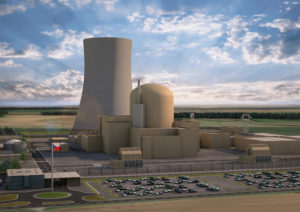 ‘EDF’s artistic view of an EPR1200 at Dukovany” EDF copyright
‘EDF’s artistic view of an EPR1200 at Dukovany” EDF copyright
CZECH FRENCH COLLABORATION FOR THE SUCCESS OF DUKOVANY 5 AND BEYOND
EDF is offering the Czech government and ČEZ a comprehensive and fully integrated offer for the construction of an EPR1200 nuclear power plant at the Dukovany site as part of a tender process launched in March 2022. EDF has also committed to supporting the construction of additional units in Dukovany and Temelín as part of the Czech government’s ambition to extend its nuclear program to additional four units.
Bringing a fleet of 4 EPR1200 units in the Czech Republic would bring significant benefits to the local industry as well as economies of scale, as part of EDF’s wider EPR fleet program in Europe.
As the only European offer for the Czech nuclear program, I truly believe in EDF’s motivation and capacity to forge a long-term commitment to ČEZ, the Czech government and the Czech Republic. The Czech Republic and France have a coordinated role to play in defending and promoting nuclear technology in Europe. That is why EDF is demonstrating its dedication not only to the construction and delivery of Dukovany 5 but also its intention to be an active partner for the Czech nuclear program in all its future phases.
EDF’s comprehensive and fully integrated offer for ČEZ and the Czech Republic is based on 5 key pillars:
- Proven technology with the highest safety standards, the EPR1200 technology is completely based on the fully proven EPR design, which has already been licensed in three European countries
- EDF’s extraordinary experience in the design, development, construction, commissioning, and operation of nuclear power plants worldwide
- A strong industrial supply chain based on EDF’s historical partners.
- EDF’s experience of local supply chain engagement with tailor-made localization programs
- The concept of a “European fleet» based on EPR technology with a number of more than 20 EPR reactors in operation, development and/or construction in Europe, which will provide synergies and opportunities for the mutual benefit of the Czech and French industries.
- EDF and its tier one partners have mobilized more than 200 experts for the preparation of the Dukovany 5 offer. Thanks to EDF’s experience in deploying EPR technology in different site conditions and regulatory environments, EDF is on track to propose an EPR1200 adapted to the Dukovany 5 site, with guaranteed high operational performance and within the timeframe set by the Czech government.
CREATING VALUE FOR THE CZECH REPUBLIC
EDF is the world’s largest nuclear operator with an unrivaled track record and expertise across the nuclear value chain. The group currently operates 69 reactors, representing more than 2,000 reactor-years of experience, and 50,000 employees across the nuclear chain.
EDF’s EPR1200 offer for the Czech Republic will bring economic benefits to the Czech economy, as it encapsulates broad and long-term business opportunities across all phases of the project and during the next 60 years of operation.
Should EDF be selected as the preferred bidder, thousands of jobs, including highly skilled ones, will be created during the construction of the Dukovany 5 EPR1200 project.
The project will also create a number of induced jobs for the local economy in the vicinity of the power plant. EDF will organize and implement programs that will help local people get jobs through training, developing apprenticeships and supporting local businesses for all services (transport, catering, etc.).
OPPORTUNITIES FOR SUPPLIERS
Our EPR1200 for Dukovany 5 offer aims to fully utilize and expand Czech engineering, production, installation and construction capacities. Our approach to localization will provide Czech companies with significant opportunities in the Dukovany project and beyond. EDF considers localization as a lever for the development of qualified resources and the support of the Czech economy.
The involvement of individual countries will also benefit the project and help achieve global competitiveness. Czech suppliers will have opportunities to enter new markets, especially other EPR projects in the world. EDF relies on the experienced Czech nuclear industry and wants to cooperate with an exceptionally qualified Czech supply chain in order to maximally support the Czech economy and ensure a high level of local participation. EDF has thus already made significant progress in localization and skills development through cooperation with leading Czech industrial clusters:
- more than 50 Czech companies have already passed preliminary qualification, in particular in the field of machinery, which is a key strength of Czech industry
- Dozens of cooperation memoranda were signed in 2021 with key Czech companies in a diverse range of expertise (assembly activities, pumps, fittings, I&C…) and many others are currently being discussed
- 3 events for suppliers have been organized throughout the Czech Republic and more will follow (more than 50 leading Czech companies participated in the last «French-Czech EDF Supplier Day» held in June 2021 at the French Embassy in Prague)
Thanks to our proven localization process we have already begun working with our Czech partners in providing them with the identification, training, and support in acquiring the appropriate skills and knowledge in order to contribute to the Dukovany 5 EPR1200 Delivery Team. EDF’s localization process includes:
- comprehensive assistance to its clients until they become fully independent in the field of human resources development (support in developing the relevant strategy, in simulating scenarios to identify potential impacts and in recruiting employees at the right time).
- tailored training with over 650 qualified and recognized professional instructors and 35 training centers.
- contribution to the creation of an on-site nuclear operator training center using a full-scale Simulator at each location.
EDF Supplier Academy offers a localized training programme on EDF’s technical and quality requirements for companies wishing to qualify as suppliers for EDF’s nuclear power plants projects. The training programme includes an overview of EPR technology, nuclear safety culture, familiarization with regulations, codes and standards, description of technical specifications and quality requirements.
Finally, EDF is open to sharing its long-term experience in supporting its clients in the field of human capacity building.

EDF Supplier Academy offers a localized training programme on EDF’s technical and quality requirements for companies wishing to qualify as suppliers for EDF’s nuclear power plants projects. The training programme includes an overview of EPR technology, nuclear safety culture, familiarization with regulations, codes and standards, description of technical specifications and quality requirements. Finally, EDF is open to sharing its long-term experience in supporting its clients in the field of human capacity building.
What are the major challenges for your sector in the national and international area in the world of today and tomorrow?
In the Czech Republic, the biggest current challenge connected with the Dukovany project construction is the gradual decline of experienced workers from the nuclear industry, combined with insufficient interest of young people in studying at technically oriented schools, even secondary or university education. Previously a strong, long-term and experienced supply chain, which was able to build and put into operation a number of nuclear units in the former Czechoslovakia in the 80s, now, in addition to the loss of experience, it also faces a lack of orders from the nuclear field.
A number of companies either went bankrupt outright or gradually reoriented themselves to other types of production. We have certainly not yet lost the ability to build a nuclear power plant in the Czech Republic, but a number of problems have arisen in the meantime, and a lot of effort and investment will be needed to bring the Czech nuclear industry back to where it always belonged.
A similar trend can be observed across developed countries in Europe, North America and Asia. Despite efforts to rekindle the attractivity for nuclear power through innovation in design, such as with SMR, our industry is still struggling to bring people, and especially younger generations, to be passionate about nuclear.
Of course, the dramatic events taking place in Europe right now have exposed the energic fragility of our western economies. Yet they have also provided for a large part of the population to appreciate the incredible economic, social, and environmental benefits that nuclear power has to offer.
That being said, it is clear that we, as an Industry, can no longer function as we did in the 1980s or 1990s. We are adapting to a new way of designing, building, operating nuclear that take into account the technological, social and economic changes that our societies are undergoing. I firmly believe that together we are stronger, that is why building strong alliances with like-minded partners that will be there in 20… 50… 80 years from now is fundamental. The European framework and European cooperation in general is by all means one of the most efficient tools for securing safe, reliable, and long-lasting partnerships on the international level.
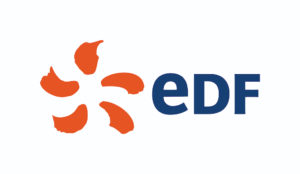
Roman ZDEBOR
Branch Managing Director
EDF Nuclear Czechia, odštěpný závod
Štěpánská 644/35, Nové Město, 110 00 Praha 1
Czech Republic
Cédric MALOUX, President of the French Tech Prague
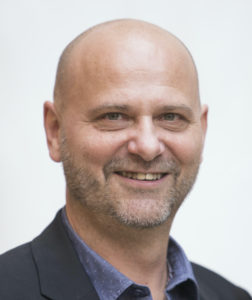 Cédric MALOUX, President of the French Tech Prague
Cédric MALOUX, President of the French Tech Prague
Launched at the end of 2013 by the French government, “French Tech” refers to anyone working in or for a French start-up in France or abroad. French Tech is primarily aimed at entrepreneurs, but also investors, engineers, developers, corporations, associations, media, public sector operators, research institutes, etc. which all share the common goal to encourage the emergence of successful start-ups in France in order to create economic value and jobs.
Despite being founded by the government, the French Tech philosophy is to rely on the French Tech members’ own initiatives to highlight what is already there and create rippling effects. French Tech initiatives are about government support, not government oversight. It is driven by the state, but built by all its community members.
The French Tech members are supported by Mission French Tech, a small dedicated team working closely with the Ministry of Economy and Finance, the Ministry of Foreign Affairs and the General Committee for Investment (Commissariat Général à l’Investissement).
Rooted in over 100 cities worldwide, French Tech Communities are the nodes of the global network. Together, they give first, power the movement locally and increase the mobility of French start-ups by welcoming them to their city. In five years, France has become one of the most dynamic tech countries in the world, with 25 unicorns (companies valued at over €1B) in 2022 compared to 2 in 2017.
Some of the initiatives under the French Tech label include:
- The French Tech Visa, a simplified, fast-track scheme for non-EU start-up employees, founders and investors to obtain a residence permit in France
- French Tech Tremplin, an initiative aimed at identifying french speaking aspiring entrepreneurs from less privileged backgrounds and welcoming them into the French Tech ecosystem. We optimise their chances of success through funding, training and mentorship. The initiative is designed to level the playing field by mimicking certain advantages these entrepreneurs would have had easier access to, had they come from more privileged backgrounds.
In Czechia, French Tech Prague was founded in May 2020 and is represented by two Presidents , (StartupYard) alongside Vassili LE MOIGNE (DT Force) and three community leads Yann BOUVIER (Valéo), Yves LE ROCH (Publicis) and Magali VOISIN-RATELLE (Business France), all of them based out of Prague.
The Supporting Founding Members of the French Tech Prague community are: ALEEGO, French-Czech Chamber of Commerce, CORKHOUSE, CREDO VENTURES, CREATIVE DOCK, DEVOTEAM, DYNACOR CAPITAL, EASYBNB, EDENRED CZ, EXAPRO, KOMERCNI BANKA, LIGHTHOUSE VENTURES, MAZARS, PUBLICIS, THALES CZ, TIME IS LIMITED and the Embassy of France in the Czech Republic.
The French Tech Prague community is now composed of over 200 people, and growing, that meet on a regular basis around four main pillars:
- Promoting the French-Czech tech ecosystem under a single label, based on France’s strengths in terms of innovation and the importance of Prague in European tech,
- Help Czech innovative companies to set up in France and French start-ups to choose the Czech Republic as a place to develop in Central Europe,
- Be a facilitator of meetings between French and local tech actors and make the community live,
- Create active links with other French Tech communities in the region and more widely in the world.
So far the French Tech Prague activities include:
- quarterly informal get together networking meetings for the members of the community,
- the creation of the French Tech Award to recognize the resiliency of a local start-up during Covid time (Awarded to Airmobis, an Aviation and Aerospace Component Manufacturing),
- the authoring of a Prague Ecosystem Guide,
- the moderation of the French-Czech Space Downstream Innovation Day in partnership with EUSPA (European Union Agency for the Space Programme), Business France and the Embassy of France in the Czech Republic,
- the introduction of 42 Prague, a unique IT school program (42) initially created in Paris, to the local Prague community in partnership with Publicis,
- the recording of a podcast on venture capital in the region in collaboration with French Tech Budapest,
- a workshop on cryptocurrencies for CJD Prague (Centre des Jeunes Dirigeants d’entreprises),
- the support of a Czech FinTech startup to help them enter the French market,
- as well as a constant technology watch on current and future trends in technology.
Going forward, the team is working on increasing its activities with local players to stimulate the local ecosystem and developing it to support French Tech goals while growing the size of its community. This materializes with the creation of new educational events about start-ups, technology trends and digital transformation in partnership with local actors such as the French-Czech Chamber of Commerce.
People interested in participating to the French Tech Prague future events can follow the official announcements on the LinkedIn page: French Tech Prague

Cédric MALOUX, President of the French Tech Prague
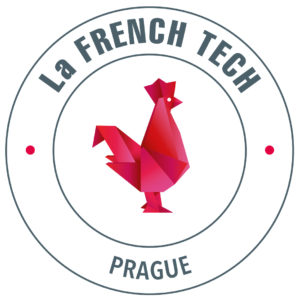
Czech Ambassador in Germany H. E. Mr. Tomáš Kafka and the German Ambassador in Czechia H. E. Mr. Andreas Künne
 Czech Ambassador in Germany H. E. Mr. Tomáš Kafka
Czech Ambassador in Germany H. E. Mr. Tomáš Kafka

There is something very special about the Czech-German relationship, some mysterious ingredient often overlooked. We’ d find it hard to explain otherwise why not only the collaboration in the economic sector has continuously grown and flourished over the last three decades and why also the relationship between the people on both sides of the border has intensified and improved so much. The people-to-people contacts have actually risen to a level known as standard between the West European neighbors and this even in places close to the border itself, meaning the places which until recently had still been traumatized by the former iron curtain. An iron curtain stretching for more than 800 km in the case of our countries.
We feel that this message has not yet reached the general public domain and Czechs and Germans may still be considered default neighbors instead of friends and partners. This is what you might think when relying only on media reports. However, the public opinion polls as well as the number of joint Czech-German projects – submitted to Brussels programs or the Czech-German future fund as a foundation established for funding projects of common interests and crowned by common success – speak a different language. They definitely reflect on more friendly, even sought-after relations between Czechs and Germans than the media pictures may convey.
How can it be, that Czech-German relations appear so under-hyped and underrated? There is no finger-pointing necessary. Not every relationship gets such attention as deserved. We shall not be sulking, since at least this time the reality is much better than the perception and that suits us more than, if it were the other way round. Czechs and Germans are thus a sort of hidden champions of their relationship. Yet, the question remains – how did it come this way?
Huge credit belongs, of course, to the economy. Both sides profit from their economic interconnection. Yet the economy is not everything (even though without it, maybe, everything would quickly turn into nothing). There must be something else yet about the Czech-German relationship. The answer may sound quite shocking to the untrained ear: it was the political representatives of both countries who managed together to achieve something quite positive: after years of negotiations, they agreed on the Czech-German Declaration, tackling the sensitive issue of our joint history and its legacy for the creation of a truly joint future. It is surely possible to recapitulate the text of this document in many different ways, however the one, which hits the point at best, goes as follows: both government acknowledged the woes and hardships citizens of both countries had suffered in the past. They also acknowledged that the legal systems of both countries do not allow for creating a cross-border state of justice and cannot tackle the ongoing problems in a sufficient way, regardless how much it may be desirable. However, both countries acknowledged that they are willing and able to create such context for future development of mutual relations, where all those shortages won´t be decisive factors anymore.
Both governments spoke, and actually both societies listened!
A rare development indeed. A case in point for the need for political leadership. By consciously deciding that it is at times better to leave an issue unresolved, they paved the way for the future. So much so that today, 25 years later, we can safely say that Czech-German relations are the best they have ever been.
As stated already, economic interdependence plays a role. And it is precisely in the economic sphere where we can see the development of our relationship. From being a prolonged workbench for German companies, Czech companies have turned into true partners: In improving products, in jointly carrying out research and development, in jointly tackling new markets. Skoda Auto is but one, albeit the most striking example.
Our cultural links have developed into exemplary ties between us as well. Czech composers, conductors, artists, authors have always played crucial roles in the German cultural scene. A young writer such as Jaroslav Rudis, who set out to write in Czech and then started to write novels in German, is a perfect illustration of this. With the “Musica non grata” project established by the German Foreign Office and the National Theater in Prague, we have jointly rocked the European opera scene, re-premiering marvels such as Schulhoff’s “Plameny”. A project created against a very serious backdrop, “Musica non grata” honours those composers and artists persecuted and frequently killed by the Nazis.
Tackling our history has always been a difficult area between Czechs and Germans. German “Vergangenheitsbewältigung”, dealing with the past, has been instrumental in paving the way for a more balanced way of looking at what divided us and what kept us together. Countless civil society initiatives in the Czech Republic have enabled us to find common ground also in the way we look at what happened in 1945 and the following years. We began to re-recognize that, for centuries, it did not make much of a difference whether you spoke Czech or German. You were a Bohemian or a Moravian first, and then you had a different mother tongue. With civil society and, to an extent, governments on both sides taking differentiated looks at our past, we were finally able to find our shared place in Europe.
Europe is where our future is. As two important actors in Central Europe, Germany and Czechia cooperate very closely on all the relevant dossiers discussed in Brussels. Our joint membership in the European Union has brought us even closer together. When you sit at the negotiating table with each other on a daily basis, you will not find yourself surprised at your partner’s positions. With this in mind, we can focus on the issues we agree on and discuss the other issues sine ira et studio. Not a mean feat, not at all. The German side strongly supports the Czech presidency of the Council of the European Union, a presidency that will have to deal with an unprecedented number of very serious dossiers. We know that we will only prevail as “the West”, as Europe, if we stand together. United as partners, allies and friends.
Then again: To say that our relations are better than they have ever been would not mean much if we rested on our laurels. Which is why we are constantly pushing for even better, even closer ties. There still is a lot to be done. Our traffic infrastructure is not as harmonized as it could be. Our health systems need to cooperate even more strongly. We need more people who speak German, more who speak Czech. We need even stronger political contacts, between governments but also between parties. In short: we need to continuously upgrade and intensify our relations. Only then will we be able to jointly tackle not only today’s, but also tomorrow’s challenges.

Czech Ambassador in Germany H. E. Mr. Tomáš Kafka

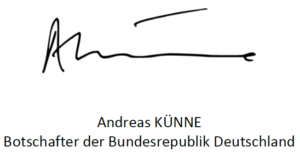
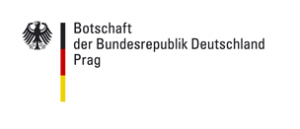
Juraj Chmiel, Ambassador of the Czechia to Slovenia
Shared History as a Ground for Future Relations
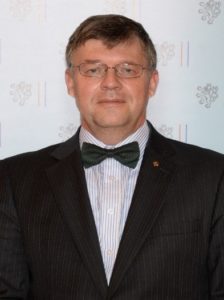 Juraj Chmiel, Ambassador of the Czechia to Slovenia
Juraj Chmiel, Ambassador of the Czechia to Slovenia
The intensive relations between the Czechs and Slovenes could be traced back to early Middle Ages, when according to historians the land of Carniola in today’s Slovenia has been a part of the Samo’s Empire with the centre in Bohemia in 7thCentury. Later on, in 9th and 10th Century the east territory of Slovenia joined the empire of Great Moravia uniting the Czechs and Slovenes in one state again. The tradition of common statehood continued in the following centuries. Between 1269 and 1278 the King Ottokar II of Bohemia connected Carniola to the medieval Bohemian state and in 15th Century the Bohemian King and Roman Emperor Sigismund of Luxembourg married the Slovenian noble Barbara of Cilli making her the Queen of Bohemia and symbolically uniting the two nations into one. From 16th Century until 1918 the Czechs and the Slovenes shared the common Habsburg monarchy. For almost 400 years both nations lived side by side, influenced each other and established a living tradition of rich and intense mutual relations, which endured the turbulent 20th Century and continues developing until today.
Both nations share the history of developing democracy, which has been suffocated by the occupation during the Second World War and then buried in the communist totalitarian regime. Both nations also share the hope in the dawn of democracy after 1989 and the will to return to Europe and join the European and transatlantic integration. We have become united again. The history of joint statehood, similar culture, cuisine, traditions, beliefs and even stories we tell our children created mutual understanding, which enables effective, smooth and productive collaboration in politics, business, culture and science as well as in tourism or sport.
In 2022 we have celebrated the 30th Anniversary of diplomatic relations between the independent Slovenia and Czechoslovakia. The Slovenes gained from Czechoslovakia an early recognition after declaring their independence and the diplomatic relations followed. After the Czechoslovakia peacefully split into the two independent states, the relations between Slovenia and the newly formed Czech Republic continued on high level standards. In 2000 Slovenia was visited by Václav Havel, who confirmed the exceptional good relations between the two countries by claiming that “With the exception of the Slovaks, it would be difficult to find two other Slavic nations that are so closely linked as the Slovenes and the Czechs”.
Political Relations: Likeminded Countries
Political relations among both countries are very close. Similar opinions and political positions are shared in a large variety of areas and international organizations. In bilateral relations there are no open issues, no grievances nor taboo topics. The relationship is open, sincere and based on a solid ground. The density of bilateral visits at all levels is very high. There have frequent visits from both sides at all levels, including Presidents, Prime Ministers, Minister of Foreign Affairs, Presidents and members of both Parliaments in the last years. The bilateral relationship is fostered by shared views on Transatlantic and European security, the future of Europe as well as by joint cooperation within the Central Europe. New formats emerged including the Three Seas Initiative and the very active format of Central Five, bringing together the former countries of Austro-Hungarian monarchy dwelling in Central Europe. During the Covid pandemics both our countries have been helping each other as the Czech Republic provided Slovenia with medical equipment in 2020 and received from Slovenia vaccines in 2021. The political authorities as well as the media have acknowledged the friendship in times of need.
We are also cooperating in the EU within a number of policies where we are likeminded countries, including the enlargement policy, cohesion policy or justice and interior affairs and in the NATO or UN. Both countries are staunch supporters of the European perspective for EU neighbouring countries including Western Balkans or Eastern Partnership. Slovenia is as well as the Czech Republic prepared to reduce the energy dependency on Russia and other authoritarian regimes. The Czech Republic was one of the first states to publicly support the Slovenian candidacy to the non-permanent seat in the UN Security Council in 2024 – 2025. The Czech policeman helped Slovenia in 2021 to safeguard its borders and protect it from illegal migration.
The Czech Republic and Slovenia also cooperate in the field of nuclear energy. Both countries have the nuclear energy included in their energy mix and the nuclear power constitutes an essential part of electric energy production and consumption. The concern about future of the European energy market with regard to the nuclear power is therefore crucial for the Czech Republic and Slovenia and the joint endeavour in recognition of nuclear energy as a clear and carbon neutral source connects them together.
During the CZ EU PRES, which started just few days ago and will last for the next 6 months, we are preparing various activities which will increase even more the visibity of Czechia in Slovenia. Activities include presentation of the Czech EU PRES in the parliament, organization of meetings between EU Head of Missions and candidacy countries with Slovenian politicians in the capital as well as in the countryside, presentation of Czechia as the EU presidency country in the regions through cultural activities etc.
Economics: Growth with Potential
The mutual trade is continuously growing. In 2021 the volume of mutual trade reached 1.733 billion EUR, which is the highest number in history, surpassing the year 2020 by more than 16.4%. Despite the pandemics of Covid-19, the mutual trade has kept growing, proving the business ties firm and resilient. Regardless of its size, Slovenia is the 25th most important Czech economic partner, while the Czech Republic lists among the top 10 Slovenian trade partners. The Czech export to Slovenia has exceeded 1 billion EUR in 2021 making Slovenia a prospective market for the Czech entrepreneurs, exporters and businessmen.
Another rapidly developing field are the investments. At the end of 2020, Czech investments amounted to EUR 311.4 million and represented 1.9% of the total volume of foreign direct investments, which ranks the Czech Republic on the 12th place among the most important investors in Slovenia. The latest Czech acquisitions – companies like SŽ-Tovorni promet or Alpina – further deepened the mutual economic interconnectedness.
There are plenty of areas of business opportunities. The economic projects for fostering the mutual economic ties are focused on defence industry, nanotechnologies, green technologies, digitalisation, infrastructure, medical devices or construction. As an example of such a project is the large economic event in 2021, when the Association of Defence and Security Industry of the Czech Republic accompanied by the Czech Deputy Minister of Defence and a great number of Czech companies have signed a Memorandum of Understanding with its Slovenia counterpart and started a new chapter in building the Czech and Slovenian business relations.
The future projects include the possible presentation of Slovenia at the Trade Fairs Brno, the leading organizer of international trade fairs tailored to the needs of the Czech economy and its industrial sectors. International trade fairs held in the Brno Exhibition Centre are a platform for development of international trade and export. Another example if a future project is the already 2nd volume of Slovenian presence at the Czech NATO Days in Ostrava, Czech Republic, the biggest security show in Europe, held after the successful visit of the Slovenian Minister of Defence in 2021.
Cultural Ties: Rich Heritage
The Czech Republic and Slovenia may present themselves with an outstanding collaboration in the field of cultural and art. The cooperation is diverse encompassing architecture, music, fine arts, literature or film and many others. Cultural bond is firmly grounded in the long history of mutual ties. The Embassy of the Czech Republic is preparing an exhibition called “Czech Footprints in Slovenia”, presenting on 22 panels the colourful palette of Czechs who left a remarkable legacy in Slovenia. The fields with Czech influence or at least a mark range from architecture, spatial planning, beekeeping, sport, movies, theatre to speleology or pharmacy.
In 2022 the Year of Jože Plečnik is being celebrated in Slovenia and the Czech Republic commemorating the 150thanniversary of his birth and remembering the life and works of the Slovenian grandmaster of architecture, who has forever changed the face of Prague. The Embassy has presented in Slovenia an exhibition covering the works of Jože Plečnik, which has already been displayed in seven Slovenian cities. Other projects include literary seminars, screening of the Czech movies, organising exhibitions and concerts. The cultural exchange between Slovenia and the Czech Republic is intense and fast growing with famous past and prospects for bright future.
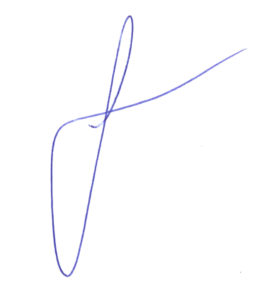
Juraj Chmiel, Ambassador of the Czechia to Slovenia

Mag. Tanja Strniša Ambassador of the Republic of Slovenia in the Czech Republic
HISTORICAL, CULTURAL AND GEOGRAPHICAL PROXIMITY
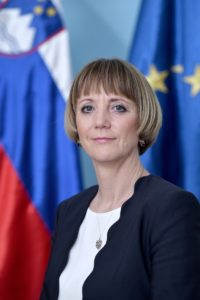 Mag. Tanja Strniša Ambassador of the Republic of Slovenia in the Czech Republic
Mag. Tanja Strniša Ambassador of the Republic of Slovenia in the Czech Republic
Slovenians have a very long tradition of excellent relations with the Czechs, which dates back many centuries to when we lived in the same state formations. Today these relations are reflected in the outstanding cooperation in all areas of our lives. The two countries enjoy high-level political relations, growing economic exchanges and rich cultural cooperation. The development of regional cooperation and the links between the numerous sister cities are of great importance in strengthening the intensive relations.
Slovenians and Czechs share a rich history in the area of Central Europe. Composer Jakob Petelin Gallus, national awakener and linguist Matija Majar Ziljski, Slavist Matija Murko, author Zofka Kveder, psychologist and author Mihajlo Rostohar, theologian and Professor Gašper Rojko, and architect Jože Plečnik are just some of the many Slovenian names that have left an indelible mark on the Czech Republic. Slovenian Countess Barbara of Celje was crowned with the Czech Crown in 1437 and was later buried with full royal honours among the great names of Czech history in the Cathedral of St. Vitus at the Prague Castle.
Among the many Czechs who worked in the territory of today’s Slovenia, it is worth mentioning that Czech inventor Josef Ressel, photographer Josip Pelikan, musicians Václav Talich and Anton Foerster, director of popular Slovenian films František Čáp and others spent their creative years in Slovenia. Before the Second World War, Czechs were important investors in the banking and textile sectors in Slovenia.
During the First World War, the Soča Front took place on the territory of today’s Slovenia, claiming many Slovenian lives, as well as the lives of over 30,000 Czech soldiers. Over 200 Slovenian soldiers are buried in the common tomb of South Slavic soldiers in Olomouc, Czech Republic.
Since 1989, the two countries have followed a common path of democratisation and integration into the Euro-Atlantic alliances. Today, the two countries are partners in the European Union, NATO and the Central European area. Slovenian-Czech relations are intertwined by a multitude of common projects, rooted in a rich common historical heritage or stemming from contemporary interests and needs, as well as the opportunities offered by the EU’s single market and the borderless Schengen area.
30 YEARS OF DIPLOMATIC RELATIONS
This year Slovenia and the Czech Republic marked the 30th anniversary of the establishment of diplomatic relations. Bilateral political cooperation between the two countries is good and friendly. There is regular political dialogue between the two countries at the highest levels. Among the high-level Slovenian visits to Prague in recent years, it is worth mentioning that the President of the Republic of Slovenia, Borut Pahor, participated in the 2019 V4+ Summit and was a keynote speaker at the international conference The Prague European Summit 2021, where he also met with the Czech President, Miloš Zeman. The then Prime Minister of Slovenia, Miro Cerar, paid an official visit to the Czech Republic in 2017, and his successor, Marjan Šarec, attended the informal Cohesion Summit in November 2019. The President of the National Council of the Republic of Slovenia, Alojz Kovšca, paid an official visit to the Czech Republic in April 2019. In the last three years, the Slovenian Ministers of Foreign Affairs, Interior, Defence, Infrastructure and Agriculture have visited the Czech Republic on multiple occasions.
PARTICIPATION OF SLOVENIA AND THE CZECH REPUBLIC IN MULTILATERAL ORGANISATIONS AND REGIONAL ALLIANCES
Today, Slovenia and the Czech Republic are EU partners and NATO allies and share many similar views. Both are strong advocates of multilateralism, a law-based international order, the rule of law and human rights. Both support EU enlargement and are long-standing supporters of the Western Balkan countries.
Slovenia and the Czech Republic often work together in the EU to push their own initiatives forward. For example, the Czech Republic, Slovakia and Slovenia were the first initiators and active supporters of European legislation banning unfair trading practices in the food supply chain and dual quality of products. An example of good cooperation between the Czech Republic and Slovenia at the EU level is the recent work of a group of like-minded Member States, which successfully advocated for the European Commission to include nuclear energy among low-carbon sources. As a very topical initiative, which was already launched during the Czech EU Council Presidency in 2022, we should also mention the recent joint letter of the foreign ministers of the informal Central 5 (Austria, the Czech Republic, Hungary, Slovakia and Slovenia) proposing steps to accelerate the granting of EU candidate status to Bosnia and Herzegovina.
Strengthening cooperation with Central European countries is in Slovenia’s vital interest. This is an area with the potential to promote Slovenia’s economic development and infrastructure interests. Slovenia cooperates with the Czech Republic and other Central European countries in the Central 5 format, the V4+ and the Three Seas Initiative.
COOPERATION AND JOINT PROJECTS IN CULTURE
One of the strongest cultural ties between Slovenians and Czechs was established by the famous Slovenian architect Jože Plečnik, who, at the invitation of the first Czechoslovak President Masaryk, renovated the exterior and interior of the Prague Castle between 1921 and 1935. This year, the 150th anniversary of Plečnik’s birth is being commemorated with a number of joint events. A special mention should be made of the exhibition of Plečnik’s work at the Prague Castle, which includes an exhibition by Slovenian photographer Saša Fuis, organised by the Dolenjska Museum in Novo Mesto. The Lifetime Achievement Award for the Development and Preservation of Architecture, named after Jože Plečnik, has been awarded since 2018 by the Prague Castle Administration and Architecture Week, and this year will also be presented to Slovenian architects and persons who have contributed to the strengthening of cultural cooperation between the Czech Republic and Slovenia. Preparations are also underway for the renovation and renaming of the street in the immediate vicinity of the Prague Castle as the Plečnik Avenue, for which a copy of Plečnik’s lamp will be donated by the Ministry of Culture of the Republic of Slovenia in agreement with the City of Prague. To mark the architect’s anniversary, the Ljubljana City Theatre and the Prague City Theatre are preparing a monodrama about Plečnik, which will be performed in both cities.
Slovenian-Czech relations extend to many other areas of culture. Two recent scientific studies address the intensities of cultural cooperation. Dr Jernej Weiss, in his monography, has described the work of more than 80 Czech musicians who were active in the area of present-day Slovenia at the turn of the 19th and 20th centuries, and Dr Alenka Jensterle Doležal, in her book « Slovenian Traces in the Czech Environment », has published studies on the rich Slovenian-Czech literary and intercultural relations.
The strength of cultural ties is also reflected in the fact that the Slovenian language has been taught at the Charles University in Prague for more than 100 years and that Slovenian lectureships also operate at the universities of Brno and Pardubice. In mutuality, Czech is also taught at the University of Ljubljana. Czech is one of the languages into which Slovenian literary works are most often translated, and Czech authors are also often translated into Slovenian. Both contribute to the preservation of Slovenian and Czech in a globalised world and strengthen European linguistic diversity.
Among the major cultural cooperation projects in the recent period, we would like to highlight the exhibition of Slovenian impressionists at the Prague Castle Gallery in 2019, which was the largest ever tour of the National Gallery of Ljubljana abroad. In autumn 2020, the same gallery hosted an exhibition of masterpieces from the Prague Castle Gallery.
THE RICHNESS OF PEOPLE-TO-PEOPLE CONTACTS BETWEEN SLOVENIANS AND CZECHS
The strong connective tissue between the two nations is represented by the remarkable diversity and density of contacts between Slovenians and Czechs, cooperation between Slovenian and Czech towns, cultural associations and other organisations.
One of the symbols of the long-standing ties between the two nations is the Czech Lodge at Spodnje Ravni in the Slovenian mountains, built in 1900 by Czech mountaineers from the Prague branch of the Slovenian Mountaineering Association. At that time, the cooperation between Slovenian and Czech mountaineers strengthened Slovenian national consciousness, and the lodge in its authentic Czech appearance and the close ties between Slovenian and Czech mountaineers have been preserved to this day. This year, the phenomenon of the Czech Lodge was the subject of the premiere of a documentary-feature film by Czech author Ladislav Jirásko.
The Czech-Slovenian Friendship Linden Tree Planting Initiative is more than two decades old. The first linden tree, which is the national tree of Slovenia and the Czech Republic, was planted in the Czech town of Tábor, and to date, 64 linden trees have been planted in various Czech towns, which have cultural and other links with Slovenian towns.
Slovenia and the Czech Republic are also linked by the tradition of beekeeping. The Czech Republic was one of the first countries to support Slovenia’s proposal that the United Nations declare 20 May as World Bee Day to raise awareness of the importance of bees for food production, the environment and the eradication of hunger and poverty in the world. Slovenian and Czech beekeepers are also working together on other projects. Last year, a joint project was launched to involve wheelchair users in beekeeping, and apitherapy, pioneered by Filip Terč, a Czech who practised medicine in Maribor, Slovenia, a century and a half ago, is also a common field.
ECONOMIC COOPERATION BETWEEN SLOVENIA AND THE CZECH REPUBLIC
With its stable economic and political framework, the Czech market represents an important potential for the Slovenian economy. Opportunities for greater cooperation exist in a number of areas, in particular in the environmental and other high-tech sectors, the automotive industry, design, renewable energy, tourism and the food sector.
The Czech Republic was Slovenia’s 12th most important economic partner in 2021, the total trade between the two countries exceeded €2 billion for the first time, a major milestone that shows the growing economic integration between the two countries. The Czech Republic also ranked 12th among foreign investors in Slovenia (1.9% share in the total value of inward FDI to Slovenia) and 10th among destinations for Slovenian outward FDI (1.4% share in the total value of Slovenian outward FDI).
In 2021, trade between Slovenia and the Czech Republic amounted to €1.77 billion, an increase of 19.2% compared to 2020. Exports amounted to EUR 861.9 million and imports to EUR 903.8 million. A significant upward trend in trade between the two countries was also recorded in the first quarter of 2022. The value of trade in services between the two countries in 2021 reached €385.0 million, an increase of 63.5% compared to 2020. Exports of services reached €187.9 million in 2021, while imports of services reached €197.1 million.
According to the Bank of Slovenia, the total value of Slovenian direct investment in the Czech Republic at the end of 2021 was EUR 131.0 million, which was EUR 37.1 million more than at the end of 2020. The Czech Republic ranked 10th among the destinations for Slovenian outward FDI in 2021 and accounted for 1.7% of the total value of Slovenian outward FDI. At the same time, at the end of 2021, the value of Czech outward FDI to Slovenia amounted to EUR 282.9 million. The Czech Republic ranked 12th among countries investing in the RS in 2021.
The Czech market is increasingly important for Slovenia’s Port of Koper, the largest container terminal in the Adriatic and the fifth largest automotive terminal in Europe. For Czech companies, especially those in Moravia, the Port of Koper is an increasingly important strategic alternative to North Sea ports and provides the fastest connection to Mediterranean and Asian markets.
Czech tourists account for 4% of overnight stays of foreign guests in Slovenia, which ranks them fifth among foreign tourists. The activities of the Slovenian Tourist Board and the Tourist Information Centre Slovenia in Prague, which was established in 2018, contribute to the growth of tourism by organising a number of successful promotional and professional tourism events and presentations of Slovenian tourism companies at fairs in the Czech Republic.
To boost economic, cultural and other cooperation, Slovenia opened its first Honorary Consulate in the Czech Republic in Brno in 2020.

Mag. Tanja Strniša, Ambassador of the Republic of Slovenia in the Czech Republic
![]()
Antoni Brega, Chargé d’affaires Embassy of the Republic of Poland in Prague
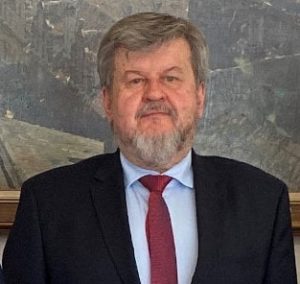 Antoni Brega, Chargé d’affaires Embassy of the Republic of Poland in Prague
Antoni Brega, Chargé d’affaires Embassy of the Republic of Poland in Prague
The density of exchange between Czechia and Poland
- The Czech Republic invariably remains an important political and economic partner of Poland in the Central European region and in the EU. We share similar views, both on the European and international agenda. The high intensity of our political contacts is encouraging – at the end of April President Andrzej Duda visited Prague, while Czech Prime Minister Petr Fiala visited Warsaw. At the beginning of June we held bilateral intergovernmental consultations in Prague, under the chairmanship of both our Prime Ministers.
- The successful resolution of one of the most complex issues in the Polish-Czech relations, that of the Turów Lignite Mine, has given us the opportunity to start a new chapter in our relations. This proves particularly important now, at the time of Russia’s armed aggression against Ukraine, when solidarity within the EU and NATO is exceptionally valuable.
- Poland and the Czech Republic have a similar understanding of key security issues, as proved by the joint visit to Kiev on 15 March by the Prime Ministers of Poland Mateusz Morawiecki, the Czech Republic Petr Fiala and Slovenia Janez Janša, as well as Deputy Prime Minister Jarosław Kaczynski, and their meeting with Ukrainian President V. Zelenski.
- We appreciate the great commitment of the Czech side in assisting Ukraine, on all levels: political, military and humanitarian. Czechia has been regularly supplying weapons and ammunition to Ukraine since the beginning of the Russian invasion. Poland, like the Czech Republic, categorically condemns Russia’s attack on Ukraine and invariably supports it – materially, financially and technically.
- We must not forget that it is crucial to maintain sanctions pressure. We cannot leave Russia time to recover its forces and operational capabilities. We must act with determination and without hesitation.
- At the same time, Poland and the Czech Republic, are already thinking about the post-war reconstruction of Ukraine. The international community must be ready when the time comes to rebuild Ukraine on a large scale. The Czech Republic and Poland were among the 40 countries that signed the Lugano Declaration, which commits the signatories to support Ukraine on its path from an early to a long-term exit from the war waged by Russia on its territory.
- We are pleased that the Czech Republic, like Poland, unequivocally supports Ukraine’s EU membership. We agree that granting Ukraine candidate status for the EU membership was of great political and symbolic importance. The road ahead will not be easy, but we believe that a new chapter in the EU-Ukraine relations will give it a new impetus. This is in the interest of the whole of Europe.
- We attribute great importance to the political and military partnership between Poland and the Czech Republic. We are reliable allies in NATO and an important partners in the EU. Our partnership and cooperation is based on a similar assessment of the security challenges in the region and on NATO’s Eastern flank, and on the recognition of transatlantic cooperation as the foundation for Europe’s security.
- In the current geopolitical situation, one of our common priorities is energy security. This includes both jointly building independence from Russian fuels (despite different levels of dependence of Poland and the Czech Republic) as well as building coalitions within the EU and sharing experience. We closely follow the engagement of our Czech partners in the energy security issues. We do understand that for our Czech partners, giving up oil imports from Russia is also a question of the country’s energy security. The Czechs need time to diversify their energy sources, including building the appropriate infrastructure.
- Strengthening regional cooperation in various formats is one of Poland’s priorities. Despite the achievements made by the countries of the Central European region after 1989, it should be noted that our region will still need internal solidarity, cohesion and the ability to properly represent its fundamental interests.
- One of the most important formats for regional cooperation is the Visegrad Group, which, in over 30 years of its existence, has become one of the most effective regional formats in Europe. From our perspective, the V4 is an effective and flexible platform for joint activities and initiatives. Its focus is mainly on the EU-related issues and policies. Our four countries share many similarities. This means that in the coming years the scope for further cooperation will continue to be broad.
- We look forward to a successful presidency of the Czech Republic in the EU Council in the second half of 2022. We declare our full support for Czech’s presidency priorities. It is important that the voice of our region is well heard in Brussels.
- The Czech presidency in the EU Council provides a unique opportunity to keep the attention of the EU countries on the areas of priority for our countries, including support for Ukraine, the internal market, security, the EU enlargement, the Western Balkans and the Eastern Partnership.
- We wish best of luck for the Czech Republic in leading the EU this semester and we will be more than happy to support our close neighbour, partner and ally in this demanding task.

Antoni Brega, Chargé d’affaires Embassy of the Republic of Poland in Prague
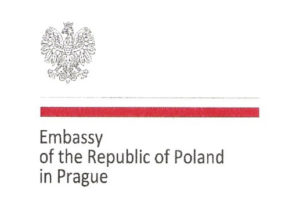
Helena Langšádlová , Minister for Science, Research and Innovation
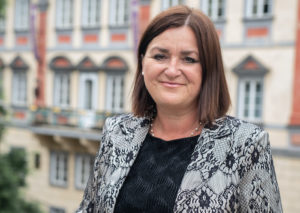
Helena Langšádlová , Minister for Science, Research and Innovation
RESEARCH HAS A KEY ROLE TO PLAY IN RAPIDLY STRENGTHENING EUROPE’S STRATEGIC AUTONOMY
The Czech Republic enters the Presidency of the Council of the EU in times of serious multiple crises. The current threats to the European economy, society, and democracy, caused by Putin’s war, bring about new demands in science, research, and innovation policy that go far beyond the need to increase funding for defence and security research.
The current crisis exposes the accumulated strategic dependence of European countries on inputs and technologies from other, often risky, parts of the world. We are discovering that we lack not only raw materials, but in some cases also the knowledge and innovation infrastructure. This shortfall, caused by excessive optimism in irreversible globalization that was to provide an impetus for democracy across the globe, will not be easy to make up. Research has a key role to play in this, as it can help to rapidly strengthen Europe’s strategic autonomy, including critical areas such as chip development and production.
Another lesson I would like to stress is the strategic nature of research itself. There could hardly be a stronger reminder that research and innovation have their essential security implications. We need to monitor much more closely the financial and institutional links of European researchers and research organisations to non-democratic countries. I certainly do not wish to suggest that every collaboration with Chinese research entities is problematic, but the risks are there, and we should strive to minimize them.
The third reinforced lesson I derive from the current situation is the importance of cooperation in science and research within the EU. The current challenges are so complex that, in order to tackle them, they require effective cooperation of the best people and institutions in Europe, and, equally importantly coordinated use of capacities, including financial ones. There is no shortage of money going into science and research in Europe, but we need to make better use of the potential synergies between different financial resources and to prioritise more consciously. The EU’s ability to set priorities for investment in research and innovation can be a model for nation states, where the ability to enforce research priorities is often limited.
Synergies in research and innovation funding are one of the priorities of the Czech Presidency of the Council of the EU. A conference on this topic was held in Prague at the beginning of July, which resulted in the Prague Declaration on Synergies in Research and Innovation Funding in Europe. It calls in particular on Member States to link more closely their national and regional funding mechanisms to European schemes, including European Partnerships and European Missions. It also stresses the importance of synergies between public support instruments at all levels and private resources. Private investment is an important resource for research and innovation and will become even more important as the EU’s innovation environment strengthens. I believe it is absolutely essential that all public policies in this area include careful consideration of the impact on private sector investment. The aim should not be simply to avoid crowding out private investment, but to encourage it, to foster crowding in. These aspirations are shared by several initiatives including the Seal-of-Excellence instrument, European Partnerships, and European Missions.
The energy sector will undoubtedly be one of the main research and innovation challenges in the coming years. It is an area that is not only absolutely crucial to our future life and our strategic autonomy, but also extremely exciting and rich in terms of the technological solutions being explored and developed. We are talking not only about the possibilities of using different sources of electrical and thermal energy, but also about storage technologies and technologies leading to energy savings. In all three areas, we see rapid progress made by dispersed teams in multiple countries. Competition between different research teams and their technological solutions is an important driver for progress. However, it also brings challenges for targeting of public support so that it does not a priori favour any technological solution among those that fit the agreed taxonomy, nor any region or country.
This brings me back to the importance of cooperation across the EU. Czechia is one of the countries for which the possibility of intensive international cooperation, including opportunities for labour mobility, is still something we value very highly. One of my priority topics is the development of human resources in science and research. I am focusing on conditions for women in research, which we decidedly need to improve in Czechia, opportunities for PhD students and post-docs, and also international mobility. We very much welcome the opportunities offered by the Horizon Europe framework programme, particularly through the Marie-Curie Sklodowska Actions. But there are many international initiatives and networks and the EU-13 countries are often less involved than would be appropriate – both for the specific countries themselves and for the European Research Area as a whole. One of the objectives of the Czech Presidency is therefore to communicate these gaps and to look for opportunities to widen funding instruments and balance involvement across member states.
The Czech Republic is an ambitious Central European country with cutting-edge research in many areas and state-of-the-art research infrastructures. The ELI BEAMLINES research centre, together with facilities in Romania and Hungary, has recently formed the ELI ERIC consortium and offers world-leading laser technologies. Thanks to this project, a mid-sized post-communist country is now a leader in an important infrastructure area. The focus on infrastructures reflects the relative strength of several fields, in particular in natural sciences and some technical disciplines.
In social sciences and humanities, the Czech Republic, like other countries in the region, can offer a reflection on the experience of post-totalitarian society-wide rebuilding, which remains relevant for large parts of the world. Unfortunately, Czech social sciences, and similarly social sciences in several new member states, still lag far behind in research quality and international collaboration. Slow convergence in these fields is unfortunate not only from the basic science perspective, but also from the perspective of the European project, as these research fields can provide useful insights into public policy and, particularly importantly, a useful understanding of new threats to democracy. Recent months provide a vivid reminder of the importance of defending democratic values and sharing a common understanding of facts.
I am convinced that European science will help us overcome the rising threats. In addition to the undisputed excellence of European science in all fields of human knowledge, there are important cultural aspects we can build on. I am thinking of the principles of cooperation and transparency which underpin the EU and that are currently reflected in the important initiatives promoting open science principles.
I feel certain the six months of the Czech Presidency will generate rich discussions on all these topics at the European level. I hope that it will not end with discussions though. Our future needs an interconnected and strong European science.

Helena Langšádlová , Minister for Science, Research and Innovation

STARTUPYARD, Cedric Maloux President
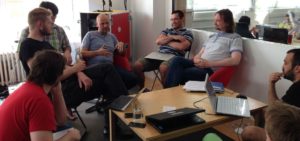
Despite being the new engines of growth for economies, startups are particularly hard to build even more so when the founders are technical first-time founders with no business experiences. For this reason, a new category of investors was created in the mid-2000’s to specifically help those with technical skills and great ambitions. Going by the name of Accelerators, this category of investors supports startups not only with cash but mainly with knowledge, experience and their network. Founded in 2011 by a group of Czech entrepreneurs and investors, Prague-based StartupYard is the longest running private tech startup accelerator in CEE. Recognizing that the CEE region is the home of many talented IT people, the goal of StartupYard, from its inception, has been to encourage, support and grow tech startups by surrounding the founders they select with a powerful network of experienced professionals (known as business mentors).
StartupYard specialises in pre-launch startups (startups which are about to go to market) led by highly technical people who need all the help in the world to become acute business people.
Since 2011, StartupYard has invested in 93 startups from 21 countries (half of them from Czechia and the rest mostly from CEE). From the Baltics, to the Balkans, founders who make it to the highly selective StartupYard program (only 3% of applicants are accepted) find themselves propelled into the business world to acquire all the skills and the connections they need to find early customers and early investors.
So far 11 of the startups accelerated by StartupYard have been acquired and 45 are still active which represents a very high success rate (over 60%) considering that when they were selected the vast majority of the startups did not have customers yet.
Czech people might be familiar with some of the StartupYard alumni like DameJidlo (acquired by Deliveroo), BrandEmbassy (acquired by Nice Technologies) or Rossum (flagged as one of the next Czech unicorns, a company valued at over €1B) to name a few of the most successful ones.
Since 2013, StartupYard has been led by French serial technology entrepreneur Cedric Maloux. Originally an engineer in Artificial Intelligence from Paris, Maloux founded its first internet business in 1996 which was acquired in 2000 by a US company. Since then, he has not stopped working as a founder and came to Prague in 2004 to build AllPeers, a globally acclaimed and award-winning peer-to-peer application for private file sharing, based on the Mozilla Firefox web browser. He is also known for successfully turning around Geewa, a Czech social gaming company, from money losing to profitability. Maloux is also the President of La French Tech Prague, an official Advisor to the French Ministry of Trade (Conseiller du Commerce Extérieur de la France) and a Board Member at the French-Czech Chamber of Commerce.
In 2016, StartupYard decided to narrow its focus and became the first European accelerator to specifically cater for Deep-Tech startups (mostly in the fields of Artificial Intelligence and Cryptography) after realising that AI and cryptography were becoming increasingly major trends in IT and that the successful startups of tomorrow would certainly be powered by one of these technology.
Today, StartupYard is running 3 programs in parallel:
- Deep-Tech,
- MedTech (in partnership with the Czech ePharmacy giant Pilulka),
- Blockchain (in partnership with Brno-based blockchain startup Tatum).
StartupYard is backed by Czech VC’s Credo Ventures and Rockaway Capital as well as a few local business angels. For business angels, investing into an accelerator like StartupYard allows them to gain access to a curated dealflow while spreading their investment risk over multiple startups.
So far, startups in the StartupYard portfolio have subsequently raised over €100m, have created 1,000’s of jobs and served millions of customers around the world.
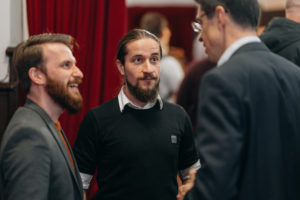
The success of StartupYard is mostly due to the strength of its network in Czechia and abroad as well as the combined power of its 125 business mentors who are helping the founders pro-bono. The mentors pool is composed of experienced corporate executives from some of the largest international corporations present in Czechia, as well as successful local tech entrepreneurs and investors who are all sharing their know-how and connections to ensure the startup founders get early traction.
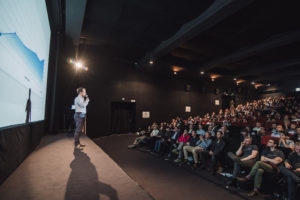
As a result, the StartupYard Deep-Tech program is industry agnostic and focuses on founders with strong technical backgrounds who use their knowledge to tackle global problems. The most successful companies in the StartupYard portfolio are startups in the fields of Artificial Intelligence (Computer Vision, Machine-Learning, Natural Language Processing) and blockchain.
This is far from surprising because the CEE in general and Czechia in particular are hotbeds when it comes to AI and crypto which both require serious mathematical skills, one of the strengths of the region.
Prague is the birthplace of the world’s first hardware crypto wallet (Trezor), the first Bitcoin mining pool (Slush), the world’s largest Bitcoin ATM manufacturer (General Bytes), Europe’s largest VC firm (€120m) dedicated to the blockchain industry (Rockaway Blockchain Fund) and the home of Paralelní Polis, the first coffee shop to accept cryptocurrencies in Central Europe.
In the field of AI, The Czech Institute of Informatics, Robotics and Cybernetics (CIIRC) from the Czech Technical University in Prague is at the forefront of Industry 4.0 with the teaching of students and the technology transfer to industry in the fields of automatic control and optimization, robotics, artificial intelligence, computer graphics, computer vision and machine learning, designing software systems, designing decision and diagnostic systems and their applications in medicine, energy transport, smart homes and smart cities.
Likewise, the Prg.ai association founded in 2019 by a group of academics from the Czech Technical University in Prague, Charles University and the Academy of Sciences of the Czech Republic with a significant contribution from the capital city of Prague is working on making full use of the local potential and turn Prague into a European centre of artificial intelligence.
Artificial Intelligence is to the 21st century world what electricity was to the 19th and 20th centuries and is already massively present in our day to day life. Whether you are doing a search on the web or looking at a news feed on your phone, there is an AI in the background making sure to serve you the best results. All the vertical industries are being rapidly transformed thanks to new machine learning techniques and the growing availability of data. At the same time, blockchain technologies are freeing data from proprietary silos and introducing traceability and accountability and the concept of dematerialised trust (via mathematical proof) instead of relying on opaque central organisations.
All these initiatives, in combination with a large number of venture capital investments flowing into the region has turned Prague into a leading tech hub in Central Europe. In order to maintain its lead, Czechia needs to produce more IT specialists, prepare its labour force for the change in paradigm facing the world and encourage entrepreneurship. For this reason, StartupYard continues to fund very early stage startups created by highly technical people because it is them who will build tomorrow’s successful businesses for the benefits of the whole world.
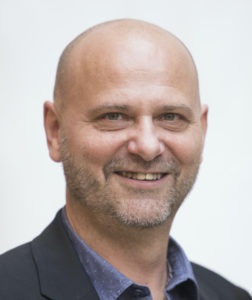

Cedric Maloux, President of StartupYard

Michal Pěchouček, Chairman of the Executive Board of prg.ai
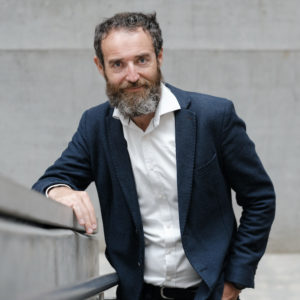 Michal Pěchouček, Chairman of the Executive Board of prg.ai
Michal Pěchouček, Chairman of the Executive Board of prg.ai
Can you briefly introduce us to prg.ai?
prg.ai was founded in 2019 by academics from the Czech Technical University, Charles University, and the Czech Academy of Sciences, with a significant contribution provided by the City of Prague. This synergy of human and institutional resources is driven by the ambition to make full use of local potential and transform Prague into a European centre of artificial intelligence.
We support talent and business, strengthen the relations between research and application, promote the local ecosystem abroad, and enlighten the public on the benefits and risks of artificial intelligence. As a non-profit initiative, we strive for a prosperous innovation environment, thereby contributing to Czech economic and social development.
Our actions and projects contribute to building, developing, and interconnecting such an innovation ecosystem.
Could you present the Prague AI scene and the perspectives of its development?
The field of artificial intelligence is already firmly established on the Prague academic scene. The Czech Technical University and Charles University both offer first-class AI education, enabling their graduates to rank among the world’s best in sub-fields such as computer vision, robotics, or natural language processing.
Articles authored by researchers at these universities have been published in prestigious scientific journals, and their breakthrough findings improve the functionality of Google Translate, Spotify, or Amazon Alexa. Even the Falcon 9 Rocket by SpaceX is learning to land with the help of Czech experts on artificial intelligence.
Access to such industry leaders provides students with the opportunity to participate in research projects alongside trailblazing companies or to take part in prestigious international competitions. In conjunction with quality teaching, such experience enables them to develop a promising career in industry and research, at home or abroad.
Thanks to the excellent academic environment in Prague, dozens of successful companies have sprung up here and their AI-powered products and services are celebrated around the world. In addition, several industry giants such as Cisco, H2O.ai, and Honeywell have established their research departments here.
AI is expected to contribute in hundreds trillions of US Dollars to global GDP. For Czechia to play a significant role in the new economy, we need innovative companies and startups that develop products and services reaching far beyond our country’s borders. What’s more, we need well-established companies successfully implementing innovation in real-life use cases.
Could you give us an idea how important is the AI related business sector for the economy?
As mentioned previously, the vision of our association aims to turn Prague into a European centre of artificial intelligence. To achieve this goal, however, we lacked a comprehensive analysis of the private sector, which plays a crucial role in Prague’s AI ecosystem. Therefore, we decided to map the local AI company landscape, get to know the relevant players and gain insight into the size of the local market and its mechanics. The result of our work is the first ever study of its kind, which we decided to publish in a comprehensive form that is accessible to industry professionals, journalists and the public alike, titled Mapping of the Prague AI company scene.
The first part of the report summarizes main results of a survey we conducted from January to June 2021 among 130 companies. We worked with a representative sample that included small, medium and large Czech product and consulting companies operating in Prague as well as foreign entities with research and development capabilities in Prague.
We were interested in what technologies Prague AI companies use to develop products and services, how these companies are funded, what sectors and countries their products serve, and how they recruit employees for their technical teams. Yet the survey also included an opinion question about what could be the key to making Prague a European leader in AI.
And some of the key findings? A typical Prague AI company is young, self-sufficient and export-oriented. Main product or service domains are machine learning, natural language processing and machine perception (incl. computer vision). Key markets are EU and North America and key industries served financial services, ICT, retail and e-commerce, healthcare and manufacturing.
On over 50 pages readers will also find articles, interviews and overviews that
complement and expand on the themes emerging from our data collection. Industry members of prg.ai such as Avast, DataSentics, Resistant AI and Rossum have contributed articles to the study on topics ranging from the importance of data and AI strategy for customers, to tips for successfully adopting AI solutions for business and building a world-class product powered by machine learning. This mosaic of thought-provoking and inspirational information was illustrated by companies such as Ataccama, Deepnote and Semantic Visions, which have helped raise Prague’s profile on the world stage.
We devoted an entire special section to the status of women in science and across the private sector — according to the World Economic Forum 2020 report, women make up only 26 percent of the data and AI workforce, while the prg.ai survey showed that their share in Prague-based companies is even lower. Throughout the report, we therefore introduce a promising female scientist, an accomplished developer, and startup director, as well as the experience of inclusive employers.
The study is rounded off with an overview of the main achievements and successes Prague saw in 2021, focusing specifically on educational and research institutions which play an indispensable role in the development of the local innovation ecosystem.
What are the major challenges for prg.ai and members in the national and international area in the world of today and tomorrow?
Czechs are challengers of the AI world. We have excellent universities and talented people, and we can solve business problems, whatever the industry. But to make a real impact, we need to raise awareness in the EU and worldwide. Almost one third of Prague based companies generate 90 % or more of their ML/AI revenues outside of the Czech market – that seems to be a good start.
The key to growth is to educate more people in AI skills. Once there are more experts, there will be more AI activities, more AI startups, and more practical uses
of AI across industries. SMEs are crucial. If they start using AI solutions and finding value in them, then the industry will boom worldwide. It is important to improve the flow of ideas and solutions from academia to successful businesses and startups.
The technical talent in the Czech Republic is outstanding. We should make sure that this talent stays here and has opportunities for growth. However, we should hone our entrepreneurial mindset — people should set up companies and not just get employed by corporations.
We also need to attract international talent. Easy to say, hard to do. We should be more open as a society, implement a fast-track immigration process for experts, simplify administration related to company creation, and streamline stock-option plans for Czech legal entities.
Michal Pěchouček, Chairman of the Executive Board of prg.ai

Marian Jurečka, Deputy Prime Minister and Minister of Labour and Social Affairs
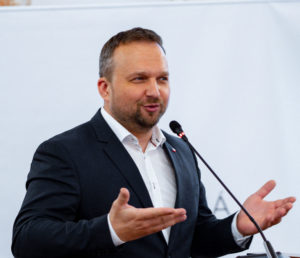
Marian Jurečka, Deputy Prime Minister and Minister of Labour and Social Affairs
The crisis shows European cohesion. Difficult times can make us stronger
The Czech Republic took over the presidency in the Council of the EU just a few weeks ago. As we know, the time we are in now is very changeable and it is extremely difficult to predict what will happen tomorrow. The world is now facing a great number of problems and challenges. Europe is no exception. Most of all, we are witnessing unprecedented aggression, which is taking place just a short distance from our borders. Putin’s Russia has militarily invaded a sovereign state. For absolutely no reason. Huge number of people had to leave their homes and hundreds of thousands of such people have found safety in the Czech Republic. Coping with the unprecedented refugee wave resulting from Russia’s aggression requires European cooperation and solidarity. But the refugee crisis is not the only problem we will face in connection with the war in Ukraine.
Energy security and self-sufficiency will also be a key topic of the Czech presidency. Strengthening Europe’s defence capabilities and cyberspace security, strategic resilience of the European economy – these are the challenges we face. But there is no doubt that the Czech Republic is more than ready to accept this task.
Rising energy prices linked to Russia’s aggression against Ukraine, global economic developments, the transition to a carbon neutral economy and the search for new sources of energy as the EU reduces its energy dependence on the Russian Federation are significantly complicating the social situation of many EU residents and households, especially among the elderly and single parent households. The issue of energy poverty is one of the key challenges of social cohesion in the EU and the Czech presidency wants to contribute to the search for effective solutions to this challenge.
When it comes to other employment and social work priorities, the ageing of European society, the introduction of new technologies, the digitalisation of industry and services and the transition to a carbon neutral economy will require activating all available human resources, adapting workers and improving their skills to be able to compete in a rapidly changing labour market. That is why will support the introduction of effective tools for the integration of people with disabilities into the labour market, lifelong learning policies and career guidance through quality training and public employment services, the implementation of the Package of measures for the integration of people with disabilities into the labour market, the Action Plan to Support the Social Economy and the Commission Recommendation on effective active employment policies, including increasing labour market flexibility.
We want to underline the EU’s commitment to reducing child poverty by 2030, in particular by promoting their access to education at all levels and supporting steps to implement the European Guarantee for Children. In this context, the Czech Republic is ready to launch the debate on the draft Council Recommendation on the revision of the Barcelona targets with a view to its early adoption. We want to focus on the new EU Care Strategy aimed at reforms to develop accessible, quality and financially sustainable long-term care services and will work towards the discussion and adoption of the Council Recommendation on long-term care.
The topic, which is current not only in the Czech Republic, is working conditions of workers on online platforms. As part of this effort, we will make it a priority to achieve a general approach by the Council on the Directive on working conditions of workers on online platforms and to advance the negotiation of the Directive on the protection of workers exposed to asbestos at work.
This is a list of the most important priorities of the Czech presidency in the Council of the EU not only in the field of employment and social affairs. As we can see, there is a lot of work ahead of us. I do not think there are tasks ahead of us that we would not be able to solve. We suspect it will not be easy. But in recent months Europe has once again shown that it can hold together strongly. This is a key certainty that we can rely on.This is what makes the European community so strong and so important.

Marian Jurečka, Deputy Prime Minister and Minister of Labour and Social Affairs 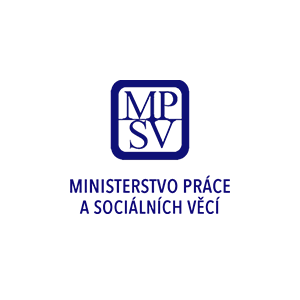
Martin Kupka, Minister of Transport
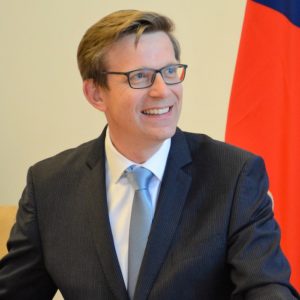 Martin Kupka, Minister of Transport
Martin Kupka, Minister of Transport
Journal Général de l’Europe (JGDE): Can you briefly introduce us to the Ministry of Transport?
Martin Kupka (MK): The Ministry of Transport of the Czech Republic is the central authority of the state administration in transport matters. The Ministry of Transport is responsible for transport legislation in the Czech Republic. The Ministry of Transport, through its subordinate organisations, implements the construction of motorways and class I roads. Class II and III roads are owned by regions and municipalities. It also carries out maintenance, repair and construction of railway lines and waterways. The Ministry also has various competences in air transport and its subordinate organisation is the Air Traffic Control. The Ministry of Transport also acts as a contracting authority for public rail transport in the Czech Republic. Interestingly, the Ministry of Transport also covers space activities and space projects, where the Czech Republic has a lot to boast about. Mainly in cooperation with ESA and in cooperation with EUSPA, which is based in Prague.
JGDE: What are your priorities for the Presidency?
MK: The priorities of our Presidency are the interconnectivity of transport networks in Europe and the adjustment of the applicable scope of the TEN-T fast connection system. Both should enable better connections for everyone. For the Czech Republic this will mean an opportunity to build not only high-speed rail lines, but also to further modernise the entire transportation network. Our Presidency is a great opportunity and prestige for the Czech Republic and we want our country to be clear at the end of the Presidency about how transport will change in the coming years not only in the Czech Republic but also in Europe.
One of the key topics of the Czech Presidency will be the reduction of emissions and promotion of environmentally friendly transport, and safe and smart mobility. This can also reduce our dependence on fossil fuels and boost competitiveness, which are other important areas the Czech Presidency will be addressing.
A discussion on the revision of the TEN-T policy as a way to ensure better transport connectivity in the EU will be among our priorities. In this area the Czech Republic wants to focus in particular on the development of high-speed rail lines. Better
connectivity of transportation networks is also important with regard to the renewal of Ukraine’s infrastructure.
JGDE: Could you present the Transport economic area and the perspectives of development? The role of rail, environment and digitalization?
MK: I consider the role of digitisation in transport to be very important. By 2025, I would like drivers to be able to handle most requests and applications online without having to visit the office. Already today, drivers can buy an electronic vignette or drone operators can register a drone online.
As far as the economic situation is concerned, the Czech Republic is facing the challenge of securing money for transport infrastructure. In terms of the European Union, rail transport is considered an environmentally friendly form of transport, and so we are able to obtain EU funding for the construction of high-speed lines thanks to our cooperation with Germany and Austria.
In road transport, we are gradually learning to involve PPP projects in construction. The pilot section of the 32 km of the D4 (from Prague to Šumava close to Germany) motorway completion, which is being implemented by the French consortium Via Salis, is one of the positive examples. We are now preparing other PPP projects to make transport in the Czech Republic as competitive as possible.
In the field of green transport, the Ministry of Transport has a role in the development of legislation and the construction of a network of charging stations. Recently, the pace of construction of charging stations has been accelerating (the number of charging points has more than doubled in the last 2 years). The current ratio of battery electric vehicles per charging station (3:1) is significantly better than the ratio required by the European Union (here 10:1). Compared to other EU countries, the Czech Republic ranks 8th.
Together with the Minister for the Environment, we have softened what I consider to be a directive deadline for banning internal combustion engines. Now, according to our demands, the European Commission must examine in 2026 whether this deadline is realistic and feasible.
JGDE: Could you give us an idea about the important sector, the international collaboration and the most important Czech companies who play a strategic role?
MK: The Czech Republic is one of the most industrialised countries in Europe and has a strong tradition in the construction industry. Among the typically Czech companies in the construction industry with an emphasis on railways is OHL ŽS, which was founded in 1952 and is involved in the construction of transport infrastructure, as well as the repair of buildings and the construction of new housing.
Among the major railway carriers in the Czech Republic is České dráhy, a state-owned enterprise that provides transport services for the state and regions. Another carrier is Regiojet, which is strong in bus transport and in the last 10 years also in rail transport. Regiojet is newly introducing night services to various European cities and regularly operates services from Prague to Croatia in the summer.
In the field of security and electrification of railway transport, a major company is Elektrizace železnic Praha, a. s. . It participates in the construction of catenary elements for railway, tram and trolleybus transport. The company was founded in 1954.
JGDE: What are the major challenges for Transport in the national and international area in the world of today and tomorrow?
MK: The situation caused by the Russian aggression in Ukraine must certainly be stabilised. I believe that energy and fuel prices, which are crucial for all modes of transport, will soon be stabilised.
Transport, especially automotive transport, is facing major changes in connection with technological innovations – electromobility and hydrogen cars. Everything must be sensitively introduced so that cars are still available to people and not only the richest buy them.
Freight transport is still struggling with the effects of the coronavirus pandemic and the resulting delays in the delivery of goods from major ports. I believe that Europe will also cope with this situation and that freight transport will become one of the pillars of the economic development of the European Union.


Miroslav FUKAN, Executive Director OLTIS Group

Miroslav FUKAN, Executive Director OLTIS Group
Can you briefly introduce us to OLTIS Group? And the IRFC event of October 2022?
OLTIS Group is a Czech Company for Information Systems in Transport.
It is a purely Czech business entity comprising member companies. Since 1997, it has stamped its authority on the information systems market for transport and logistics through sustained success and reliability. The associated specialized software companies within OLTIS Group work synchronously and effectively, thereby offering complex and highly customizable information system solutions wherein several key components are tailored to the needs of the clients. This is one of the key strengths and the niche of OLTIS Group.
IRFC 2022 (International Railway Forum and Conference 5-7 October 2022) is a significant event with the auspices of the Czech Presidency to the EU council, and this is the 7th conference, which first started in 2008. This conference is focused on the entire rail sector description. It means that at the upcoming sessions, all topics important for the railway sector will be discussed. The conference is held under the motto which is « Let’s build the railway system of the new generation together. » So, it is about cooperation in the railway sector.
The main conference benefit is seeing the networking of politicians, top managers, and persons responsible for the rail system development in Europe. And last but not least, the conference will assess if the sector is really on the right path to build the new railway system of the future together. So, this is the message which is now in preparation to be addressed to the entire railway sector in Europe and the Czech Republic. That is, how to contribute more significantly, faster and on the right path to the development of the rail system.
What are your priorities for the Presidency?
The presidency is a great opportunity and matter of prestige for the Czech Republic. Our aim is to have a clear roadmap by the end of the presidency, regarding how transport will change in the coming years, not only in the Czech Republic but also in Europe.
The key priorities of our Presidency are:
– the interconnectivity of transport networks in Europe and the adjustment of the scope of the TEN-T rapid transport network that is still in force. Both should enable better transport for all. In this area, this is an important opportunity for the Czech Republic to build not only high-speed lines, but also to further modernize the entire transport network.
– reducing emissions, promoting environmentally friendly transport and safe and intelligent mobility. This can also contribute to reducing dependence on fossil fuels and boosting competitiveness, which are other important priority areas.
– discussing the revision of the TEN-T policy as a way to ensure better transport connectivity in the EU. The Czech Republic wants to focus on this area, in particular on the development of high-speed railways. Better connectivity of transport networks is also important with regards to the infrastructural renewal of Ukraine.
In addition to the above-stated priorities, safe and intelligent mobility includes autonomous transport, as well as support for research and innovation in this and other areas.
Could you present the OLTIS Group economic area and the projects, the perspectives of development and the strategic role you could play?
OLTIS Group is a strong IT Group in Central and Eastern Europe
It is a purely Czech private group of specialized software companies closely cooperating since 1997.
The main development base and headquarters is located in Olomouc, Czech Republic, with its own subsidiaries in Slovakia, Poland, and Hungary.
The Group companies are socially responsible for the region, environment, employees, and customers. The whole Group is composed of more than 200 employees.
OLTIS Group brings to the market Comprehensive Software Solutions for Transport, Forwarding and Logistics
Two of our core areas of focus are IT systems for Infrastructure Managers and Freight + Passenger Railway Undertakings, which constitute complex IT support solutions for ensuring railway operation during the entire life cycle of a train.
The advantages include highly interconnected data, consolidated and comprehensive solutions, including data communication with information systems of railway undertakings as per TAF TSI.
Our comprehensive logistic solutions cover the entire logistic chain, which includes major links like infrastructure managers, railway undertakings, forwarders, road freight transport, factory transport, warehouses.
Research, Development, and Innovation Projects are at the heart of OLTIS Group activities. We have been actively involved in Shift2Rail Projects. Since the start of the new EU financial period, we are actively participating in Europe’s Rail JU.
I see the strategic role of OLTIS in the area of interoperability of IT systems (TAF/TAP TSI) and their implementation in Central and Eastern Europe.
OLTIS Group Products Are Verified as Compliant with TSI.
Railway regulatory interoperability as an EU priority requires compliance with the regulatory, technical, and operational conditions contained in the European Parliament and European Council directives.
Could you give us an idea about the international collaboration and OLTIS Group´s role in its environment and sphere of digitalization?
Since 2009, OLTIS Group Has Been Active Abroad, Especially with European Institutions and Organizations.
This includes:
– Association of the European Rail Industry (UNIFE) ― active work in committees and working groups of the SME Committee, Freight Committee, Digital Platform, Cyber —Security and Communication.
-Representation of UNIFE in the TAF / TAP TSI change management process at the European Union Agency for Railways (ERA).
-European Commission’s Expert Group on Competitiveness of the European Railway Supply Industry.
-International Rail Freight Business Association (IBS).
OLTIS Group places emphasis on minimizing the impact of its activities on the environment. The modern HQ of OLTIS Group in Olomouc is equipped with state-of-the-art technology and ranks among notable energy-saving constructions.
Despite its size, OLTIS Group still maintains its family environment. The team consists mainly of long-term employees (dozens of colleagues have been working in the companies for more than 20 years) and all team members are recruited from our branch offices or from nearby. Therefore, the group is a stable employer supporting the local labour market.
The companies of OLTIS Group are actively engaged with the concerned community through supporting and fostering healthy social life in a number of ways:
For many years, OLTIS Group has supported Charity Šternberk, the Children’s Home of Dagmar in Brno and the S.O.S family house for temporary stay « Sindbad ».
Financial contributions are dispersed among smaller sports clubs and interest organizations in the areas of operation of the companies.
OLTIS Group‘s role in the sphere of digitalization is represented by its custom development, services.
OLTIS Group has over 20 years of experience in implementing bespoke information systems. This is a complex solution that is connected to the existing corporate systems and applications. A team of fully qualified personnel support customers from the analysis and information system design to the final implementation and staff training.
All these steps are followed by complete technical support and service after full handover. The emphasis is placed on data security and on the systems itself. Additional services include consulting, advisory and cloud services in the field of information systems and information technologies for transport, forwarding and logistics.
What are the major challenges for your sector in the national and international area in the world of today and tomorrow?
The most important challenges for the railway sector in the current period are:
- building Single European Railway Area,
- increase the capacity of existing EU railway infrastructure,
- to complete the implementation and development of the new generation of ERTMS,
- implementation of Green Deal in transport sector by reducing CO2 emissions and shifting freight from road to rail,
- digitalization of entire transport sector,
- currently another concern is to cope with the energy crisis, the impact of the Covid pandemic and to strengthen the role of rail in connecting the European network with Ukraine
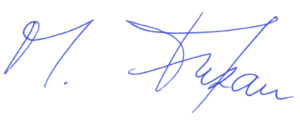 Miroslav FUKAN, Executive Director OLTIS Group
Miroslav FUKAN, Executive Director OLTIS Group
IRFC 2022 IN PRAGUE A SUCCESS? by OLTIS GROUP
DO YOU CONSIDER IRFC 2022 IN PRAGUE A SUCCESS? by OLTIS GROUP
The IRFC 2022 conference was the largest conference of the railway sector during the Czech presidency of the Council of the European Union and a unique event in Central and Eastern Europe not only in terms of topics, but also in the participation of important persons and organizations from the political and professional fields.
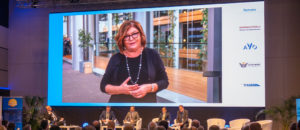
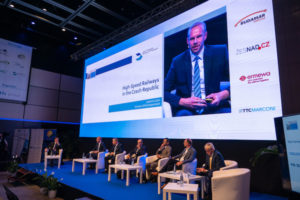
Minister of Transport of the Czech Republic, Deputy Prime Minister of Luxembourg, Head of Cabinet of the Commissioner for Transport, Ambassadors of France, Sweden and Japan, representatives of DG MOVE and DG RTD, Executive Directors of ERA, Europe’s Rail JU and CER, Director General of UNIFE, representatives of major railway undertakings and infrastructure managers (e.g. DB AG, SNCF, ÖBB, ČD, Czech Railway Administration) and many others agreed that in order to create a modern railway and for its further development, attention must be paid to:
- create unified railway transport policy and harmonization of conditions with other modes of transport within Europe.
- help the railways as the largest consumer of electricity and fuel in the current energy crisis
- accelerate the deployment of low-emission rail transport (hydrogen technology) and research and innovation in the field of digitization, automation and robotisation with the aim of higher operational safety
- support the need to share and exchange data and ensure cyber security
- develop Europe’s railway network as a resilient, high-capacity and high-speed infrastructure.
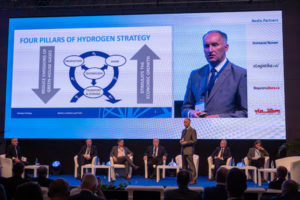
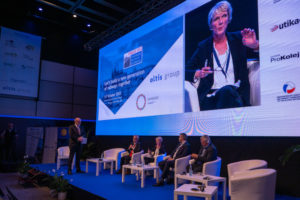
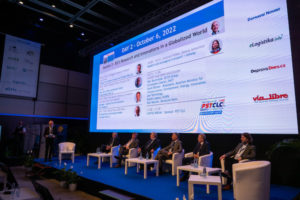
The European railway must connect Europe, not divide it. Thanks to this agreement, the conference was very successful and creates the conditions for the future that together we will really create a modern railway of the 21st century.

Anna Hubáčková Minister of the Environment
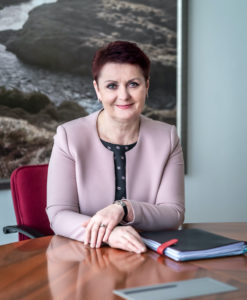 Anna Hubáčková Minister of the Environment
Anna Hubáčková Minister of the Environment
Can you briefly introduce us to the Ministry of the Environment?
The Ministry of the Environment is the central governmental authority and supreme supervisory authority in environmental matters in the Czech Republic. Our competence includes the protection of water, air, nature and landscape, soil, mineral resources as well as waste management. We are responsible for assessing the environmental impact of activities and their consequences, including those that cross national borders. Also, specially protected areas including national parks are designated by the Ministry of the Environment. We develop environmental legislation and monitor compliance with it and we manage national environmental policy. Ministry´s tasks include also providing grants, training and support environmental education across generations. We coordinate the actions of all ministries and other central authorities of the Czech Republic in environmental matters to ensure and control the activities of the government.
What are your priorities for the Presidency?
A major task for the Czech Presidency is the finalisation of the « Fit for 55 » legislative package. Negotiations in the trialogues await us. I am pleased that the positions of the Council and the Parliament appear to be similar in most aspects so I believe that the negotiations will be successful. The climate package is very complex so we hope that we will be able to reach a compromise on as many of the proposals as possible. We see the political importance of achieving the Paris Agreement’s greenhouse gas reduction targets, both at national level and in relation to global partners.
In addition to climate protection, our next priority is to find a common ground between Member States on the new draft law on nature restoration. This long-awaited major milestone in nature conservation will ensure the restoration of damaged ecosystems. In this context, we would like to emphasise that promoting adaptation to climate change is of equal importance to reducing emissions.
Referring to the current world situation, we need to focus even more on improving the EU’s raw material security and energy independence. It is essential to start developing renewable sources, both to protect the climate and to reduce the EU’s dependence on Russia. We are also emphasising the gradual reduction of the EU’s dependence on Russian fossil fuel imports in line with the REPowerEU plan.
In the area of the circular economy, we will work to complete negotiations with the European Parliament on the Battery Regulation. Other negotiations concern the revision of the Industrial Emissions Directive, as well as the Air Quality Directive, which we expect to be presented by the European Commission in autumn. These are also parts of the framework agenda of the European Green Deal, which is gradually being incorporated into EU legislation.
During the Czech Presidency, the Ministry of the Environment also wants to draw attention to the issue of light pollution which has been neglected at the European level. The increase of light pollution is caused by excessive or inappropriate night lighting remains a serious global problem that negatively affects humans and living nature.
The Ministry will represent the position of the whole EU at two key international events of the year. The first is the UN Climate Change Conference COP 27 in Egypt where we will build on the commitments made in Glasgow and it will be necessary to find a concrete form of financial assistance for developing countries in order to decarbonise, adapt and repair the damage already caused by climate change. The second is the United Nations Conference on Biodiversity, COP 15 which will take place in Canada, where a new Global Biodiversity Framework is to be adopted. The adoption of this ambitious new plan will require a compromise to be found between all the Parties of the CBD. Overall, we will have to represent the EU’s interests at more than two dozen international conferences during the Czech Presidency.
Could you please present the economic aspects of the environment and the perspectives of development? The role of environment and digitalization?
Environmental crises including climate change and biodiversity loss, can threaten employment, human health and social security. It is essential to promote the principles of circular economy and sustainability. Material consumption is constantly increasing so it is necessary to return waste materials to the economy, to motivate people to share and lend things, and to streamline processes in companies and governmental organizations. Minimising waste and reusing it, boosting the economy through digitalisation and streamlining logistics routes are challenges for the coming years.
The Ministry of the Environment has developed the Strategic Framework for the Circular Economy of the Czech Republic 2040, which enshrines the principles of the circular economy in the Czech Republic. The strategy aims to maintain the value of products, materials and resources for as long as possible in the economic cycle and return them to the production cycle at the end of their use while minimising waste generation.
The strategy seeks primarily to reduce the actual generation of waste to improve waste management by emphasising recycling (by promoting recycling technologies) and reuse, improving in particular bio-waste, textile, construction and food waste, packaging and obsolete electronics. The use of secondary raw materials is a priority for industry, construction and energy. The State will support in public procurement those companies that use products containing secondary raw materials and recycled materials.
By implementing these measures, the Czech Republic aims to improve waste management including positive effects on the achievement of national climate and other environmental targets. Improving security of material supply and reducing dependence on material sources imported from outside the EU as well as increasing the competitiveness of businesses.
Digitalisation represent a useful tool to accelerate the transition to a climate neutral, circular and more resilient economy. Our ministry already provides a number of widely used services that are in varying degrees of digitalisation.
For instance, applications for subsidies from the State Environmental Fund, applications for financial support under the New Green Savings Programme, reporting forms for the transmission of data on pollution of various environmental components (water, waste, air, etc.) or the transport of hazardous waste are fully digitised. These digital services are generally used more by businesses than by the general public.
Most of the environmental agendas such as the trade in endangered species of wild fauna and flora – CITES Register, have been satisfactorily digitised with a gradual increase in the convenience of digital services, e.g. in terms of simplifying logging in or sharing content data with other authorities. However new or renewed systems are also being developed at the Ministry of the Environment. Currently in 2023 we are preparing a new waste management information system in line with current digitisation trends.
The Ministry´s ambition by 2025 is to deploy a simple contact interface that will offer all relevant services to citizens and services in the field of the environment via a self-service portal on the web. Hence it will also be possible to carry out tasks that have not yet been able to be handled fully digitally such as obtaining certain types of certificates, certifications, authorisations, etc. The services of electronic environmental information portals for the general public are also being improved, in particular with a view to increasing the supply of open data.
Could you give us an idea about the important sectors and the most important Czech companies who play a strategic role in the environment?
Half of the 10 largest companies in the Czech Republic by revenue are from the energy sector, the others mainly from the automotive, chemical and food industry. All these sectors have a major impact on the environment and are also key to managing the green transition successfully. This is why companies are focusing on environmental activities such as investing in renewable energy, improving energy and material efficiency, reducing production and better use of waste, protecting natural resources or reducing traffic congestion.
The success of the companies is also due to the nature of the Czech economy, which is open and significantly dominated by exports. Economic growth over the last thirty years has been significantly driven by foreign investment, which is reflected, for example, in a greater willingness to invest in research. Importantly, foreign owners receive far more dividends and profits from the Czech Republic than Czech owners of companies and capital in general from abroad. The difference has almost reached up to CZK 300 billion a year.
Another important factor is the significant position of the automotive industry and its related supply chains, which will pose a major challenge to the socio-economic transformation associated with the Green Deal. A third factor is the concentration of emissions-intensive manufacturing, in particular iron, steel, lime and cement, which account for 45% of greenhouse gas emissions. I am therefore pleased that the Czech Republic is one of the first in the EU to start drawing money from the Modernisation Fund. The interest of companies in subsidies, especially for investments in renewable energy sources, is enormous.
The Ministry of the Environment also works closely with key players in the market. In July it concluded a Memorandum of Cooperation on Climate Protection, Energy and Some Related Areas together with CEZ, the second largest energy company in the country. Both parties will work together on the comprehensive decarbonisation of all segments of the Czech economy. CEZ wants to achieve carbon-neutral operation as early as 2040, the previous target was 2050. We are also preparing a similar memorandum with Škoda Auto, the largest Czech company.
The Ministry will seek to support companies in their transition to climate neutrality, especially in the construction of renewable energy sources such as photovoltaics and agrivoltaics. To ensure energy security and independence, we must transform the Czech energy sector towards clean energy sources that do not burden the environment with local emissions or CO2 emissions in line with the Green Deal for Europe.
5/ Could you give us an idea about the international collaboration of the ministry? Could you please name the specific projects?
The Ministry is working to strengthen its position on the European and global stage and to develop international cooperation. It is necessary to work across borders and sectors in the field of environmental protection. Therefore, we develop active relations with partner ministries of other countries, participate in the activities of international organisations, exchange experiences and implement international projects, conferences and seminars.
Recent examples include the Czech Republic’s contribution to the Global Environment Facility (GEF). In June it was increased by a record amount for the next four years, which will support large-scale initiatives aimed at tackling the loss of biodiversity and forests, improving the health of the oceans, combating pollution and reducing the impact of climate change. In spring we also supported the hosting of the prestigious World Environmental Education Congress (WEEC) in Prague.
I would also like to mention the signing of the Memorandum of Cooperation between the Czech Republic and Ukraine in July. We have undertaken to help Ukraine in solving long-standing environmental problems as well as remedying the effects of the war on nature.

Anna Hubáčková Minister of the Environment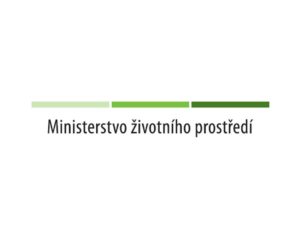
Vilem ZAK, GA member and Director of The Water Supply and Sewerage Association of the Czech Republic (SOVAK CZ)
 Vilem ZAK, GA member and Director of The Water Supply and Sewerage Association of the Czech Republic (SOVAK CZ)
Vilem ZAK, GA member and Director of The Water Supply and Sewerage Association of the Czech Republic (SOVAK CZ)
The Water Supply and Sewerage Association of the Czech Republic (SOVAK CZ) is a voluntary, non-profit organization in the field of water management and sewerage for the public. The association was established by the foundation charter concluded in Kutná Hora on 23 November 1989 and registered in Prague on 12 November 1992. SOVAK CZ has 113 regular members and 123 associated members nowadays.
SOVAK CZ is a member of EurEau (European Federation of National Associations of Water Services) and cooperates with several significant national or international organizations.
SOVAK CZ goals:
- to represent its members in negotiations with the state authorities in problems which are in the common interest of its members (primarily related to the field of legislation, the technical normalization and to the creation of economic regulations),
- to secure activities and services according to the requirements and interests of its members, particularly an informative, methodical, consultancy and educational character,
- to cooperate with similar organizations in the Czech Republic and abroad,
- to issue the professional magazine Sovak for members and expert public,
- to hold professional training sessions, courses and other educational events for its members throughout the year.
SOVAK CZ in the Czech Republic is trying to achieve equal conditions in water sector, setting legislative processes that will suit to all its members and ensure good conditions for their functioning what means the supply of drinking water, removal of wastewater and its subsequent treatment.
As a member and during the presidency in European Commission SOVAK CZ will focus on Urban Waste Water Directive actualisation, implementation of Drinking Water Directive and other legislative framework related water sector.
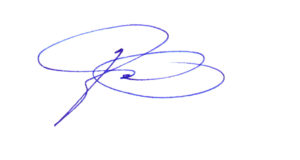
Vilem ZAK, GA member and Director of The Water Supply and Sewerage Association of the Czech Republic (SOVAK CZ)
![]()
Zdeněk Nekula Minister of Agriculture of the Czech Republic
Agriculture and food in the Czech Republic and the objectives of the
Czech EU Presidency
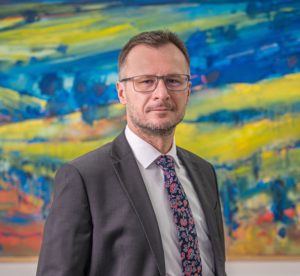 Zdeněk Nekula Minister of Agriculture of the Czech Republic
Zdeněk Nekula Minister of Agriculture of the Czech Republic
Our agriculture and food industry is a traditional sector of the national economy. The most important group of crops grown in our country is cereals, which cover more than a half of the sown area. We are the world’s largest producer of aromatic hops, and we are also the world’s leading producer of poppy seed. We also grow oils seed crops, legumes, sugar beet, potatoes, hops, fruit, vegetables and vines, as well as medicinal and root plants and flowers. Livestock production is mainly focused on cattle, pigs, poultry, sheep and goats. Bee-keeping is also important, and fish and horse breeding are not insignificant. One of the subordinate organisations of the Ministry of Agriculture is the National Stud in Kladruby nad Labem, which is one of the oldest stud farms in the world and is home to the oldest original Czech horse breed, the Kladruber horse. It has been bred for more than 400 years and is the only breed in the world that was bred specifically to pull the carriages of emperors and kings. The uniqueness of the Cladruber Horse is confirmed by their status as a national cultural monument. Thanks to this, it is the only living creature in the Czech Republic under conservation protection, as well as under the protection of the Food and Agriculture Organization (FAO). In addition, since 2019, the landscape for breeding and training ceremonial carriage horses in Kladruby nad Labem has been included on the UNESCO list.
Specific to Czech agriculture is that it has the largest average farm size of all EU countries, 133 hectares. We have 15% of our agricultural land under organic farming and we are among the 15 countries in the world with the highest share of organically farmed areas in total agricultural land, and we are ranked 4th in the European Union.
In the Czech Republic, we produce quality food that is safe for consumers. The local food industry and its products have a long tradition, building on the craftsmanship and skill of our ancestors. Producers, large and small, are taking Czech food production to an even higher level with new, modern concepts. Consumers can navigate the range of food products on offer by quality labels such as “Klasa, Regionální potravina and Česká potravina”. The Ministry of Agriculture supports farmers’ markets, yard sales and local food. In the Czech Republic, as in the EU as a whole, food production, including beverages, is one of the main sectors of the manufacturing industry. Some food processing enterprises are directly linked to primary agricultural production, while others are involved in the finalisation of the resulting products.
Our Republic is trying to strengthen food self-sufficiency in the main commodities natural to domestic agricultural production. One of the most important export commodities is Czech beer. Its renowned name abroad helps export not only beer but also brewing technologies and raw materials for its production. The history of the Czech, as well as the world brewing industry, began in 1842 in Pilsen. The unique bottom-fermented pale lager from this West Bohemian town gave its name to the world’s best-selling type of beer (Pils, Pilsner). Thanks to its uniqueness, the whole world knows it as Pilsner Urquell. We also have a purely Czech, and at the same time world-famous brewery, the national enterprise Budějovický Budvar. Czech beer carries the Protected Geographical Indication label. We are also one of the world’s three largest hop producers. With over 80% of the world’s hops exported, Czech hops also form the quality basis of the world’s beers. The Czech Republic is also the country with the largest area of a single hop variety in the world, and our “Žatecký poloraný červeňák” (Hops of Saaz variety) is an indigenous variety with unique characteristics and quality.
As far as our landscape is concerned, we belong to countries with a high forest cover and a rich forestry tradition. Forests currently cover more than one third of the country’s territory.
The area of coniferous trees has been decreasing in recent years and the share of deciduous trees, especially beech trees and other broadleaves, has been increasing. This is due to the continuous efforts of foresters to achieve an optimal species composition of forests.
The Czech Republic took over the EU Presidency from France on 1 July, and I thank them for their work, which we will certainly build on in many ways. Our main objectives in the agricultural sector are climate protection, ensuring biodiversity, the development of sustainable farming and sustainable food production. The invasion of Ukraine by the Russian Federation has completely changed the geopolitical situation on our continent and has also demonstrated that the European Union is capable of a decisive response. The events of recent months have shown that Europeans can act very quickly, effectively and unitedly in a crisis caused by an external threat, perhaps to the surprise of outside observers. Because of the war in Ukraine, one of our most important tasks is to ensure sufficient food not only for Europe but also for the whole world. The war is having a huge impact on the agricultural and food sectors, and the Czech Presidency, together with the European Commission, will therefore be looking for ways to help these sectors. In order to ensure that we have enough food, we need to keep food production high quality and safe. We will therefore regularly monitor the situation on the commodity markets and at each Council of Ministers meeting, i.e. once a month, we will address this issue and take the necessary measures.
In order to prevent instability and possible shortages of certain commodities on the market in the European Union and in third countries, we must, first and foremost, continue to maintain open trade at global level, coordinate the activities of international organisations and address the rise in the prices of agricultural products, oil, energy and fertilisers with specific targeted measures. It is in our interest to act in unison within the Union and in synergy with other world leaders. During our EU Presidency, we will contribute to stabilising and creating conditions for the reconstruction of Ukraine, including in the field of food production and agriculture. Global partners and international institutions must be involved in a comprehensive recovery plan for the war-torn country. The abolition of import tariffs and import quotas for Ukrainian products improves the situation on the EU and global markets. It will allow Ukraine to free up warehouses for this year’s production. In this respect, all the activities under the solidarity lanes are also beneficial. The Common Agricultural Policy (CAP) also plays an important role in food security. Therefore, it is important to postpone the obligation to rotate crops and non-productive areas and to strive for flexibility within the CAP that will not further affect the wording of the national Strategic Plan for the Common Agricultural Policy and will not lead to a resignation to the objectives originally set.
Our next important priority will be to reduce the consumption of pesticides, which must be a task for the whole of Europe. According to the Farm to Fork Strategy, the whole Union should reduce pesticide consumption by 50% by 2030. We will lead the debate on the sustainable use of plant protection products so that this target is met with a fair distribution among all Member States. However, it is essential for Europe to be able to ensure that it can provide sufficient, high-quality and safe food for consumers, while protecting health and the environment.
The Czech Presidency will also focus on the prevention of deforestation. The European Commission is proposing to introduce a system under which companies would have to prove that the production of their products has not led to deforestation and the degradation of forests, especially rainforests. The idea is to prevent the unnecessary degradation of forests and woodlands due to the production of certain commodities. We need to protect nature sufficiently and, at the same time, when setting rules, make sure that we do not jeopardise the supply of certain products or foodstuffs because of new bureaucratic obstacles. A related theme will be the promotion of sustainable forestry, which is particularly important now during long periods of drought. The Czech Presidency will create a space for discussion on the future of the Standing Forestry Committee. The EU does not have a common forestry policy, so it is important to take into account the diversity of forests across the EU when managing forests.
We are in difficult times and we have many difficult tasks ahead of us, so we need to avoid any instability, and we will succeed if we act in a united way in the European Union and are able to find compromises.

Zdeněk Nekula, Minister of Agriculture of the Czech Republic
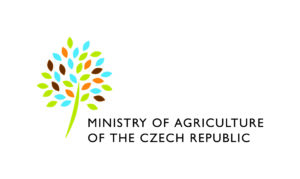
Prof. MUDr. Vlastimil Válek, Deputy Prime Minister and Minister of Health
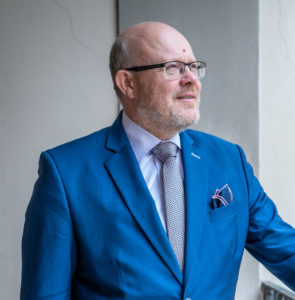
Prof. MUDr. Vlastimil Válek, Deputy Prime Minister and Minister of Health
We are living through a difficult time plagued by civil and health threats.
The COVID-19 pandemic and Russian aggression have certainly changed the way we think about global health and our lives. What these threats have not changed, however, are our plans and attitudes concerning quality healthcare for European citizens. The goals and priorities we have presented remain relevant and important. We need to move forward. Experience from recent years has prompted us to start implementing our ideas so that we can do even better in the years to come.
We are aware of the inequalities and individuality in Member States’ experiences in the healthcare sector and are committed to leading dialogue across Europe in order to achieve unity. Our priority is to improve citizens’ health through a high-quality and comprehensive healthcare system that is efficient, fair and accessible to every European. In the future, it will be very important to provide free access to primary healthcare for all. Quality of life for children, young people and seniors living in the European Union is a priority.
Together with my colleagues, I welcome this opportunity to share our experience with European citizens during our Presidency of the Council of the EU. I would therefore like to present to you the health priorities of our Presidency.
Within the framework of our informal EPSCO Council meeting, we will continue to look for ways and options to combat the COVID-19 pandemic and improve the EU’s preparedness for future health crises.
It is also important to address long-term EU priorities in areas such as oncology, the European Public Health Data Space, medicines, rare diseases and vaccination.
One of our priority agendas is cancer. It is also one of the key priorities of the EC, which issued
Europe’s Beating Cancer Plan last February.
We also organised a conference on oncology, the results of which will be discussed at the September ministerial meeting.
We would also like to initiate and advance the discussion within the framework of the European
Health Data Space, which aims to harmonise health data sharing
in digital form for research, innovation and policymaking, as well as cross-border healthcare provision.
The topic of vaccination is equally important. A particular priority is increasing confidence in vaccination and combating misinformation, an area strongly supported by the EC.
Topics such as the current refugee crisis and its consequences, or future challenges such as the expansion of disease areas in relation to climate change will also be important.
We believe that discussion and solving problems and challenges will strengthen our families, our communities and public health as a whole. Through our Presidency, we are determined to contribute to helping to make the European Union a better place for all.
 Prof. MUDr. Vlastimil Válek, Deputy Prime Minister and Minister of Health
Prof. MUDr. Vlastimil Válek, Deputy Prime Minister and Minister of Health
![]()
Vladimír Balaš, Minister for Education, Youth and Sport
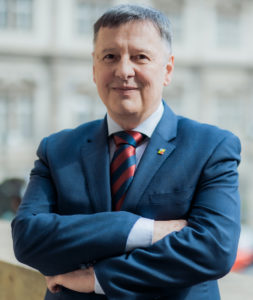 Vladimír Balaš, Minister for Education, Youth and Sport
Vladimír Balaš, Minister for Education, Youth and Sport
Czech Priorities in the area of Education, Youth, Sport, and Research –
Opportunity for “New Europe”
The Czech Republic takes over the Presidency at unprecedented times. The world has not yet fully recovered from the Covid-19 pandemics when the barbaric Russian aggression against Ukraine changed the geopolitics in Europe. And we all had to use the substantive “War” together with present tense “IS”. The “War is” in Europe.
It shattered values we have taken for granted. We all need to remind that human rights, freedom, democracy, or legal state are the principles that formed Europe and must not be questioned. Yes, these principles are expensive, but expensive thinks are worthy. We should not be afraid to call things true. War is war, not a special operation. Invasion is invasion, not protection of own territory. We teach these basic premises to our own children. We explore these theses in research. And these sentences form our present.
Under these circumstances, the European Union must act unanimously towards ensuring the security and peace, help refugees, resolve the energy crisis, but as well fight against pro-Russian propaganda and other tools that want to challenge our values. With regards to the strategic development of the European Union, the priorities of the Czech presidency were chosen.
Given the context, the Czech Presidency has selected its priorities in the field of education in line with the strengthening the European Education Area by 2025 and in line with the Commission approach.
We have introduced the draft Council Conclusions on supporting well-being in digital education. Our aim is to contribute to improved, more effective and safer on-line education. Most of the member states have started with the distance learning, have secured the necessary e-education tools, and have generally taught teachers how to use it. However, the impact of e-education and distance learning on the pupils, their mental and physical health, and their ability to live in both real and digital world, reflecting their specifics, is unclear. Safer on-line environment, digital and media literacy, critical thinking, information interpretation will be touched as well. Conclusions will focus on well-being in e-education in broad context, since these covid-forced, but long-awaited and predicted changes will be with us for good. The more important is to raise the question of metal and physical health of children during distance education.
The Czech Presidency will focus on the draft Council Recommendation “Pathways to School Success” as well. It was published by the European Commission the last day of June. Comparison of PISA 2018 and the post-Covid situation revealed worsening trends and even deepened the existing socioeconomic inequalities. The Recommendation aims at improving the basic skills, strengthening the upper secondary education, and reducing early school leaving. As the overall wellbeing is one of the cornerstones for the success, Czech presidency is convinced, that the Recommendation will complement the above-mentioned forthcoming Council Conclusions. The thesis that « no one will be left behind » must be supplemented by concrete steps to prevent the opening of scissors between different socio-economic, national and ethnic groups of people. Our future is built precisely on each of child and development of his/her potential, regardless of origin.
Concerning the evaluation of the European Education Area, we expect, that the Commission will publish the progress report in the forthcoming weeks. This paper could form the basis for one of the policy debates at the Council – of course, in addition to the impact of the Ukrainian crisis on the education, youth and sports agenda. The Czech Presidency will specify the topics of all policy debates later, depending on the current political situation in Europe.
Among the events planned, we want to highlight the flagship Conference CZEDUCON focused on tertiary education. European Universities and their first evaluation, microcredentials, internationalization or automatic recognition of diplomas – these are just few points of set up conference agenda.
In the field of the youth, the Czech Republic would like to introduce a new phenomenon stressed during the Covid pandemic – intergenerational dialogue and solidarity. The Youth Working Party will draft the Council Conclusions on promoting the intergenerational dimension in the youth field to foster dialogue and social cohesion. Crisis situations have shown that young people are aware of their responsibility for the present and the future. During the covid pandemic, they helped seniors with shopping, testing or IT skills. On the other hand, seniors could, for example, get involved in babysitting or tutoring. Thus, an imaginary circle was closed, where the young learn from the elders and the elders from the young.
This very current topic was also thoroughly discussed during the EU Youth Conference hold in Prague on 11th – 13thJuly. The 9th Cycle of the EU dialogue with young people, focusing on “Sustainable Green Europe” and “Inclusive Society”, was prepared by the presidential TRIO and guarantees its continuity. The European Year of Youth 2022 will culminate on the 6th December, when the European Parliament, the Commission, and the Czech Presidency will launch the conference focused on the Youth policy and the legacy of the whole year.
In the area of sports, Ministry closely cooperates with the National Sports Agency. The Czech Presidency will be dealing with the topic of Sustainable and accessible sports infrastructure. The importance of this topic is strengthened both by the Covid-19 pandemics and Russian aggression against Ukraine. This priority is in line with the objectives of the Green Deal for Europe and the Next Generation EU package. The Czech presidency will introduce the Council Conclusions on this topic, focusing on environmental, social, and economic sustainability, notably climate neutrality and energy efficiency. An important dimension builds availability of sports infrastructures, to ensure everyone has equal access, incl. Ukrainian refugees (children and adults) who, thanks to sports, can forget the horrors of war at least for a while. Nobody left behind – in sports too.
“Sport as a framework for supporting tolerance, solidarity, inclusion and other sport and EU values” is the second topis. It will be discussed at the meeting of General Directors for sport. The main goal is to brainstorm how professional athletes may support the EU values. Professional athletes are role models for the whole society. The secondary impact of their performances is huge. It turned out that Russia is trying to win some of them over to its side.
Finally, the priorities in the area of research follow the eighteen-month programme of the French-Czech-Swedish Presidency Trio. In addition, they also reflect the priorities set out by the European Commission for 2022. The Czech Presidency will focus on three topics.
- synergies in research and innovation funding in Europe:
Synergies are critical to prevent the investment efforts from being fragmented and to avoid their duplication. Only with correctly set synergies, it will be possible to harvest the full potential of public and private investments aimed at strengthening the competitiveness of European economy and reinforcing the preparedness of European society to address societal and economic challenges. The Czech presidency organized flagship conference on synergies from 7th to 8th July 2022. It brought together more than 300 European stakeholders, including at the high political and expert levels, to explore possibilities of enhancing synergies. Same topic was discussed during informal meeting of European Research Ministers from 21st to 22nd July 2022. Another goal is to adopt the Prague Declaration on Synergies, inviting European stakeholders to take action in order to remove persistent barriers and overcome existing obstacles that are hindering synergies. And to endorse the Council Conclusions on Synergies, addressing the report of the European Court of Auditors, which shall be finalised in late autumn this year
- enhancement of the European research infrastructure ecosystem:
Research infrastructures are another top priority of the Czech Presidency agenda and programme. They have proven to be irreplaceable and indispensable part of the European critical infrastructure particularly during the Covid-19 pandemic. However, the European research infrastructure ecosystem calls for further consolidation and integration. Czech Presidency therefore plans to adopt the Council Conclusions on Research Infrastructures to set out research infrastructure policy orientations for the future. On the top of that, the Czech presidency also plan to elaborate on the global dimension of research infrastructures. It will therefore hold the International Conference on Research Infrastructures from 19th to 21st October 2022 with the aim to publish the Brno Declaration on Research Infrastructures. This Brno Declaration shall acknowledge the key attributes of research infrastructures and invite research infrastructure stakeholders from all around the world to develop the concept of a global research infrastructures ecosystem.
- development of a new European Innovation Agenda:
Last big challenge for the Czech presidency is the introduction of a new European Innovation Agenda. Against this background, the Czech Presidency is envisioning endorsement of the Council Conclusions, which shall build on the Commission Communication on a new European Innovation Agenda published in early July. Czech presidency has also the ambition to finalize negotiations of the proposal for a Council Regulation amending Regulation establishing the Horizon Europe Joint Undertakings with regards to the Chips Joint Undertaking. Finally, Czech presidency shall also continue concluding the Association Agreements to Horizon Europe with third countries.
Generally, Europe is well placed to succeed in breakthrough, deep-tech and disruptive innovations. Europe is the global leader in science and new knowledge production. Europe has strong industrial infrastructure and fast-growing start-up ecosystem. European education institutions are reputable and public-private partnerships are supported. In addition, Europe also has long-term evidence-based policy orientations setting out ambitious and far-sighted goals to respond to critical societal and economic needs. Nevertheless, the global strategic competition and complex geopolitical situation that impact the supply chains urgently call for an advancement of the European innovation ecosystem. It is needful not only to facilitate the post-pandemic recovery, and twin green and digital transitions, but also to mitigate and diversify the damaging dependencies on external suppliers. Europe must reinforce its self-sufficiency in critical technologies and achieve the open strategic autonomy.
The circle is closed, the Czech presidency has begun!

Vladimír Balaš, Minister for Education, Youth and Sport
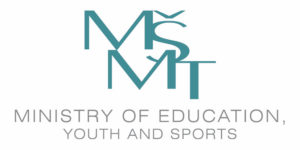
Martin Baxa, Minister of Culture
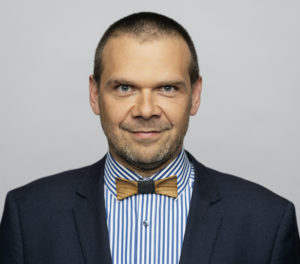
The Ministry of Culture, pursuant to Section 8 of Act No. 2/1969 Coll., on the Establishment of Ministries and Other Central Government Authorities of the Czech Republic, as amended, is the central body of state administration for
- arts,
- cultural education,
- cultural heritage,
- affairs of churches and religious societies,
- press matters, including the publication of non-periodical press and other means of information,
- preparation of draft laws and other legislation in the field of radio and television broadcasting,
- implementation of the Copyright law,
- production and trade in the field of culture.
The Government of the Czech Republic considers culture to be a defining constituent of our national identity. It is viewed as the spiritual foundation that enhances the quality of life and contributes to the creation of respected values. National culture and its presentation in the context of international cooperation is a way to place distinctive national values on the map of European and world culture, also in the context of the Czech Presidency of the Council of the European Union.
Culture is the Czech Republic’s ticket to the future: given our geographic position and historical background, we want to be a crossroad of cultures, a place of free and open exchange that nurtures our own culture while protecting inherited values and traditions. The role of the state is to provide and optimize links between culture and other areas of society, thereby enriching citizens’ lives, furnishing the economy, research and education with creative skills, motivating donations and providing sufficient resources to strengthen the country’s competitiveness in the global environment.
The State Cultural Policy 2021–2026 contains 6 principal objectives for further development in the field of culture. The first three focus on rather traditional competences of the Ministry, while the other three elaborate on new ones to boost the capacity of the Ministry to effectively manage the cultural and creative sector:
Objective 1: Increasing the availability and accessibility of culture
Main initiatives include using digitalisation to make culture more accessible and affordable, or enabling free admission to key state institutions by compensation for the shortfall in admission revenue.
Objective 2: Effective care of cultural heritage
The coherence of legislative, financial and systemic care of cultural heritage is considered crucial. We will further develop the Integrated System for the Protection of Tangible Cultural Heritage and the technological modernisation of cultural institutions caring for cultural heritage. The tools of digitisation will be used to make cultural heritage more accessible.
Objective 3: Growth of live art
Capacity building is the key element of cultural renewal. Main initiatives include artists’ social security and development of second careers. We also support interdisciplinary projects of artistic cooperation combining live arts and cultural heritage and cultural research.
Objective 4: Support of cultural and creative sectors
Cultural and creative sectors and their growth shall draw on the rich resources of talent and innovation potential in order to better reflect new visions, perception and status of culture, including the need for new tools to support the cultural and creative sector.
Objective 5: Broader role of culture in the Czech Republic
Cross-sectoral cooperation must be given more prominence. Strengthening inter-ministerial cooperation contributes to effective support for the cultural and creative sector beyond the supportive instruments of the Ministry of Culture. Essential element is the implementation of the NAKI III research programme in 2023-2030.
Objective 6: Transformation of the Ministry of Culture
The aim is to increase the capacity of the Ministry to better promote the broader role of culture and effectively support the cultural and creative sectors. The National Recovery Plan will make a significant contribution to the revival of CCSIs after the covid crisis.
Priorities of the Czech Presidency in the field of culture, audiovisual and copyright
The priority of the Czech Presidency in the field of culture is the adoption of a new Work Plan for Culture for the next period. The text will be discussed within the Cultural Affairs Committee in the second half of 2022, and the draft Council Resolution will be submitted to the Council of Ministers for Culture and Audiovisual for approval. It is envisaged that the plan will again be a four-year plan, covering the years 2023-2026. Together with the New European Agenda for Culture and in line with its strategic orientation, the Work Plan for Culture is a strategic instrument for EU cultural cooperation, addressing current policy developments and setting priorities with due regard to the EU principles of subsidiarity and proportionality. The future Work Plan for Culture will build on previous Work Plans and the achievements presented in the European Commission’s Report on the Work Plan for Culture 2019-2022. It should strengthen the links between Presidencies and ensure synergies with the Creative Europe programme 2021-2027. There is a call for an updated strategic framework to cultural cooperation at EU level. Priority areas for cooperation will continue to include support of cultural and creative sectors and industries to contribute to their revitalisation and strengthening, digitisation, green transition, participation and equal access to culture for citizens, preparing cultural heritage for the impacts of climate change in Europe and other topical issues, including the possibility of adopting a European status of artist.
In the field of media and audiovisual, the priority is the implementation of the regulatory framework for audiovisual media services and video sharing platforms. The Czech Presidency is also expected to start discussing part of the European Media Freedom Act legislative package.
In the field of copyright, the European Commission’s work plan includes a proposal for a minor amendment to Directive 2006/115/EC on rental and lending rights.
The Ministry of Culture organises two main Presidency conferences in Prague: Conference on Cultural Heritage: Challenges of Contemporary European Heritage Management, and Conference on Audiovisual and Copyright. In September in Brussels, an exhibition of the artist Milena Dopitová entitled Even Odd will be held in Bozar.
The Education, Youth, Culture and Sport Council will meet in Brussels on 28-29 November 2022.
Cultural cooperation projects
Actors in the field of culture cooperate extensively and intensively with many European countries. The Ministry of Culture has a subsidy programme to support cooperation projects awarded under the Creative Europe programme. Both public and private organisations, associations, festivals, concert organisers, export offices and a music business school have received grants. Unfortunately, a number of events was cancelled during the covid-19 pandemic, yet a total of 11 projects were supported by the Ministry of Culture of the Czech Republic in 2022.
Recent support has been granted e.g. to the Hub for the Exchange Music Innovation (HEMI), the Institute of Arts’ project for international cooperation of ten partner organisations from nine countries of Central and South-Eastern Europe. The activities will be carried out in three main programmes: the HEMI Incubator for music professionals, HEMI 360 for support of international careers of promising artists of the CSEE countries, and HEMI Digital – a gateway to the music market of the EU-CSEE region. Another new and exciting project is DECONFINING (Deconfining arts, culture and policies in Europe and Africa). The project is being implemented by 12 partners in 11 European countries with the aim of establishing a reference practice for sustainable and equitable intercontinental cultural exchange between the EU and Africa, with an emphasis on a new participatory framework for collaboration, both virtual and physical.
The Ministry of Culture and the whole cultural and creative sector have been heavily involved in various types of assistance to Ukraine, whether it be vocal and visible expressions of support, offers of jobs, housing and provision of basic needs, access to culture and the arts, collections or charity events. The Czech government also actively contributes to the preservation of Ukraine’s cultural heritage, e.g. by allocating 70 000 EUR from the state budget for the purchase of material and equipment needed for the protection of cultural property and its evacuation, this particular material aid was already transported to the territory of Ukraine in May.
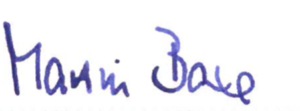
Martin Baxa Minister of Culture





